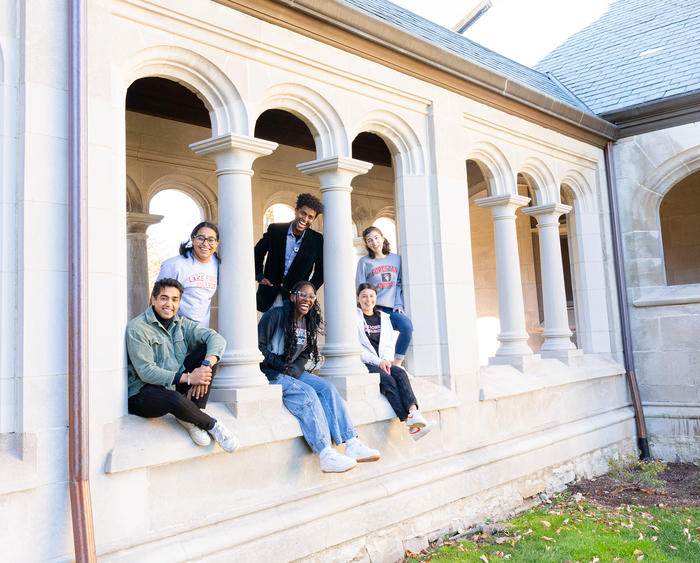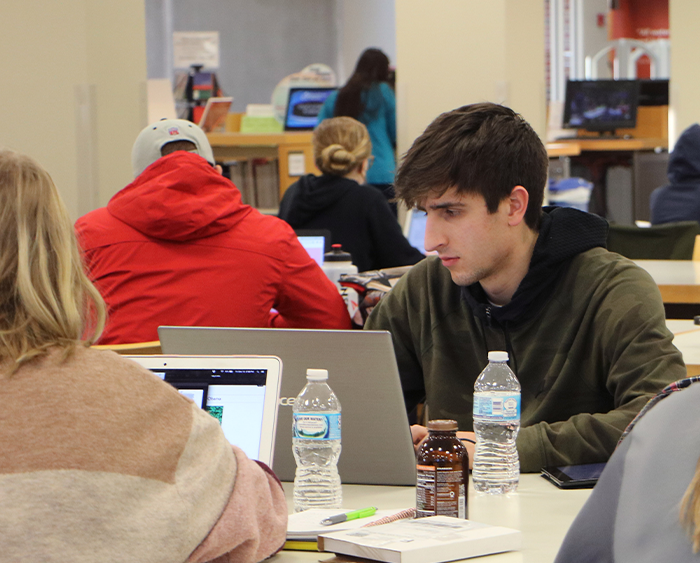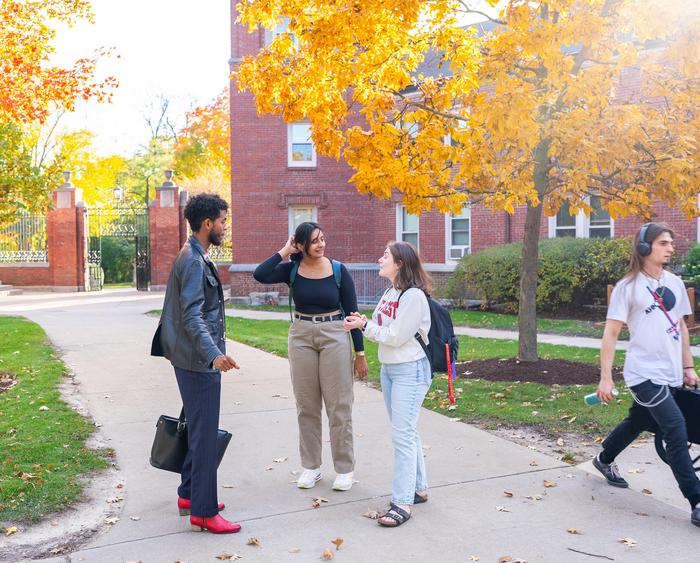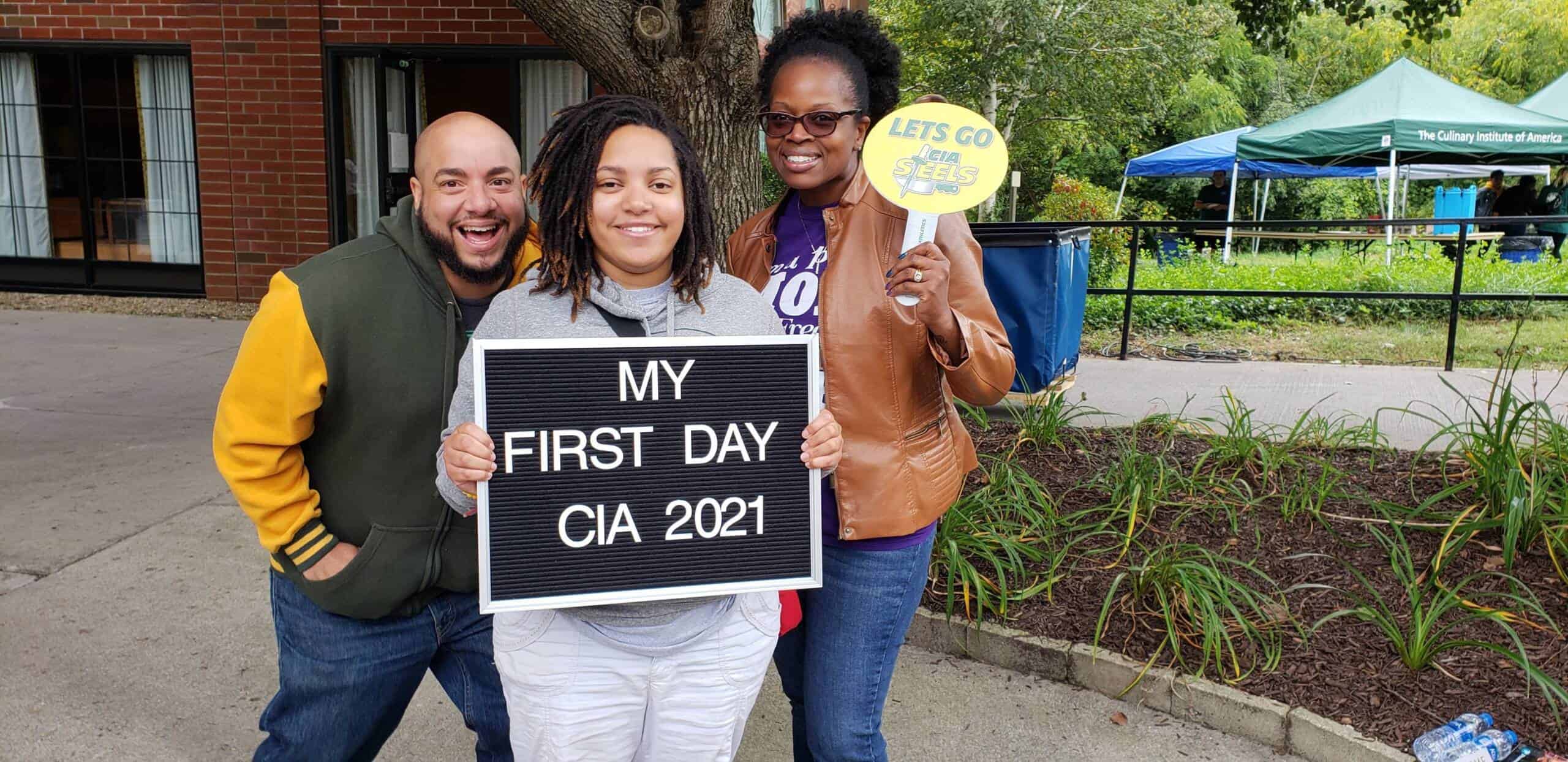What are your chances of acceptance?
Calculate for all schools, your chance of acceptance.

Your chancing factors
Extracurriculars.
Should You Go on Campus Visits With Your Parents?
Do you know how to improve your profile for college applications.
See how your profile ranks among thousands of other students using CollegeVine. Calculate your chances at your dream schools and learn what areas you need to improve right now — it only takes 3 minutes and it's 100% free.
A campus visit is the best way to gauge whether a college is a good fit. You can learn about academic and social offerings, culture and extracurriculars, and get a good feel for the school. But will having parents along for the visit help or hinder you in determining which college fits you best?
Visiting Colleges With Parents Is a Good Idea
Your parents might be seeking certain qualities in a college; you may have other priorities. It’s possible you won’t see eye to eye on all your plans. Still, there are important benefits to having parents with you when you check out prospective schools.
Parents’ help is valuable in coordinating travel, accommodations and logistics. They can help you get to campus and the surrounding areas more easily. When you visit colleges, allow time to explore nearby districts or cities together. Gauge the distance between your school and other attractions. How’s the public transportation? Where do students go on weekends? How safe does the area feel?
Another handy thing about having parents along during campus visits is that they notice benefits and drawbacks that you won’t. You’ll be busy listening and enjoying the atmosphere, and may not be able to note and remember everything you hear. Parents can be your official notetakers and photographers to help you remember more of your visit. Having witnesses to your experience lets you to evaluate and compare schools more fully once you get home.
Prepare Together Before Each Visit
Before you go on visits, check college websites. Take virtual online tours with your parents. Prepare lists of questions you’d all like answered. Some questions will be answered during the tour, but you’ll have others. Check out college website FAQ pages. Popular topics that students and parents usually have questions about include:
- Academic requirements and opportunities
- Financial aid and work-study programs
- Majors and honors programs
- Social events, clubs and weekend activities
- Study abroad opportunities
- Tutoring and counseling resources
- Residence halls and other housing options
- Internships and career assistance
- Intramural athletic programs
- Health care options
- Campus safety
Discuss Expectations Beforehand
Before campus visits, discuss which events you’ll attend together. You might suggest splitting up and looking around separately for part of your time, since you may feel freer to ask some questions or start conversations when you’re on your own. Set a time and place to meet up with your parents after you’ve had a chance to explore.
Talk with your parents about the importance of letting you initiate interactions with others on campus. It helps if you ask most of the questions during the visit; this is a good time to practice taking initiative. Your folks can foster independence by letting you take the lead in establishing your connection to the campus. Yes, they deserve answers to their questions, too, but it’s best if parents don’t take over events or direct your responses.
You might schedule admissions interviews during some college visits. While admissions officers may tell parents that they’re welcome to join in, colleges really want to get to know you . You want to be at your most comfortable during interviews, and having parents present might make you tense.
Go Beyond Canned Tours and Presentations
College visits should involve more than attending tours. Spend time wandering the campus and talking to students other than your tour guide. If you can, talk with a professor in your major. If you plan your college visit at least a month ahead, and time it during the school year, you can probably arrange to meet with a professor through the admissions office.
You might arrange to attend a class or two. This is often expected if you visit a college during your mid-winter or spring break. You will feel more comfortable doing this on your own without your parents there to draw attention.

Discover your chances at hundreds of schools
Our free chancing engine takes into account your history, background, test scores, and extracurricular activities to show you your real chances of admission—and how to improve them.
Talk with parents about what you’d like to do with them during college visits, and what you want to do on your own. You may have questions about policies or resources that you want to ask without parents present, or you might just want some quiet time to clear your head.
You can split up and explore some on your own, either for meetings with admissions officers, students or professors, or while on tours or other activities. Maybe you want to talk with student groups. You might want to ask about health care counseling and resources on campus, for example, or information about LGBTQ support and activities. Many students speak comfortably about these issues with their parents present, but some feel inhibited. Consider how you might get your most important questions answered during a visit.
Ask Parents to Let You Form Opinions Before They Weigh In
Naturally, parents want to bring up benefits or concerns and ask relevant questions during college visits. They may help you with a large financial commitment, and they have insight and experience which could benefit you—they have a right and a reason to care deeply about where you attend school. However, you’re looking for your college. If they rush in quickly with positive or negative reactions, you won’t have a chance to truly gauge your own reaction.
Visits often prompt immediate positive feelings. It may take days, weeks, even months of visits to colleges before you or your parents can balance initial good feelings with critical evaluations about what each college offers. When parents push opinions about colleges quickly before their kids have time to develop their own reactions, teens often find it harder to be open with parents during and after future college visits.
The Takeaway
You want to make sure a college is a good fit for you , not for your parents, though their assistance and input may be very helpful. While you don’t need to spend every minute together, your parents’ logistical aid, perspectives, and observations can help you glean more valuable information than you could on your own.
With preparation, discussion, and an emphasis on moving toward independence, you and your parents can plan visits that will help you maximize your time and provide a fuller understanding of how well each college might fit your needs.
The CollegeVine Blog Helps You Prep for College Visits
Check out these blog posts while you’re planning your next college visit:
Parents: Should Your Student Participate in an Overnight Admission Visit?
Should You Visit College Campuses as a Freshman or Sophomore?
What to Do After You Visit a College
Parents, Make the Most Out of College Tours With Your Teen
Curious about your chances of acceptance to your dream school? Our free chancing engine takes into account your GPA, test scores, extracurriculars, and other data to predict your odds of acceptance at over 500 colleges across the U.S. We’ll also let you know how you stack up against other applicants and how you can improve your profile. Sign up for your free CollegeVine account today to get started!
Related CollegeVine Blog Posts


The Do's and Don'ts of Parenting Kids in College
Students need to stretch themselves and a safe space to come home to..
Posted August 15, 2024 | Reviewed by Michelle Quirk
- A Parent's Role
- Take our Authoritative Parenting Test
- Find a family therapist near me
- College is a place for young adults to gain autonomy and learn skills in a supportive environment.
- Hovering communicates that parents love their students but don't have faith they can succeed on their own.
- Open, positive communication can help students find resources they need, vent, and succeed.
I am a professor getting ready to welcome a new freshmen class to campus.
I'm also a mom who just dropped off my youngest as he transferred from community college to a large regional university.
I study parenting adolescents.
College students and their parents have been much on my mind. After dropoff, I spent much of yesterday thinking about my son and resolutely not texting him. Why? I was trying to avoid some of the easy traps parents of college students fall into.
The Basics: The Goal Is Autonomy
For many U.S. students, college is a time of semi-autonomy where parents, professors, and professionals scaffold and support young adults while they make increasingly independent decisions. They live away from home; make their own decisions about dress, food, sleep, and schedules; and navigate difficult choices about friendships and sex and safe and unsafe recreation.
This scaffolding—growth with support—is designed to help young people become stronger and develop adulting skills while keeping the guardrails in place. Mistakes will be made. Drama will ensue. But through this process, students should develop more skills and more confidence — including confidence that when things fall apart, they can get them back on track.
Avoiding Parenting Mistakes: Micromanagement and Hovering
Toddlers fall when they learn to walk. Then they get back up again, try new strategies, build new muscles, and make more mistakes. If we never let go of their hands and let them fall, they never learn and never have that glorious excited joy of running into our arms.
Hovering over young adults making big decisions about courses, friends, and activities communicates something important: that they are not capable of doing this on their own. That we care, but that we don't trust them. How can they have faith in themselves if we don't have faith in them?
New students should be learning their new environment: chatting with roommates, figuring out how to navigate the cafeteria, and finding their way to classes. They should not be thinking about their parents, reassuring you that they’re OK, or replying to your texts. Let them live in the moment and be where they are.
Letting students reach out to us instead of assuming they need help communicates trust and faith in their abilities.
Effective Scaffolding: Use College Support Systems
Colleges and universities have changed a lot in the last few decades. The biggest change is adding layers and layers of student support. Students are assigned advisors to help them choose courses. This includes making choices that will move them toward finding a major, fulfilling graduation requirements, and making sure they don't overload themselves. Going to college can be like visiting a candy and used book store: so much to choose from, and it all looks good! The advisor's job is to remind students that they have lots of time for dessert and should pack in some good protein and vegetables.
Advisors can also direct students to resources. These include disability services and accommodations, mental health professionals, and career service offices. They can teach them how to effectively advocate for themselves and develop strategies for getting help when they need it. When things go wrong, students can be so overcome with embarrassment or shame that they avoid talking to their professors, or they ask for help inappropriately. Advisors can help students move forward effectively.
Most colleges also offer workshops on study skills, library professionals to help students do academic quality research, writing and quantitative skills centers to plan and polish work, and mental health services.
One of the most effective ways parents can help is to encourage their students to take advantage of these resources.
Your job as a parent is not to step in and fix your student’s problems. It is to help them find the tools to identify and fix problems themselves.
Avoiding Parenting Mistakes: Shutting Down Communication
Monitoring is a core part of effective parenting during adolescence . Parents can’t give good advice, set appropriate rules, or establish sanctions if they don’t know what is happening. The last two decades of research have really shown us that parents monitor most effectively by listening and encouraging kids to open up. That’s especially true in college.

How do you get them to open up? Don’t jump down their throats.
When adolescents and young adults have experiences they’re troubled by, talking about them helps them process their emotions, think through what happened, and discuss ways to avoid it happening again or to deal with the consequences.
Adolescents share experiences and keep talking when they can trust their parents to listen and help them through those processes. What shuts the process down? Judgment. Adolescents in my studies say one of the most common reasons they don’t share information with their parents is they think it will upset them. When parents react negatively, they now have two problems: their own feelings and yours. You may also add to their problems by increasing their feelings of shame or blame. None of those things are conducive to effective communication.
When kids open up, listen. You might even ask: Do you want to vent? Do you want support? Do you want help fixing it? Different people in different situations need different things. Give them what they need. Your job is to support them. You need information to do that. Help them talk.
Effective Communication: Let in the Sunshine
One of the things I noticed about myself is that I spent too much time talking to my kids about my worries (my kids would call this nagging). It wasn’t particularly helpful to me. It wasn’t particularly interesting for them.
One of my students, Yan Lou, did an honors project in which she studied the effect of chatting with parents on international students attending college away from home. They found that chatting was associated with increased stress . Why? Chatting didn’t help relieve student stress but talking to parents introduced new worries about what was happening at home and new stressors as parents added pressure.
Don’t do that! I have worked systematically to talk about non-nagging things with my kids. Asked them about things I know they’re interested in (I have become fluent in Dungeons and Dragons). Shared what I’m doing with my dogs. Talked about fun things we have in common.
In other words, I wanted hearing from me or getting a text to be something that they reacted to with a smile and not an eye roll. Keep it short. Keep it positive. Listen.
Avoiding Parenting Mistakes: Ignoring Clear Signals
College can be challenging, and many students can experience problems. Parents can be essential in identifying serious concerns about mental health, substance use or dating problems, and academic concerns. I’ve had many students spin out of control because they don’t ask for help—or the right kind of help. I think this is especially common in students who have always sailed through things easily. They are hitting their first speed bumps. It is also common in students who have experienced many problems before. Times of change require new learning and strategies.
Physical illnesses are one of the most common reasons for students to drop classes, fail classes, or have to withdraw for a semester. A UTI or ear infection at the wrong time of year can throw a monkey wrench into an academic schedule. Most students have never had to manage their own medical care.
These are exactly the kinds of situations where a parent who is listening can help their students find help for themselves or—if the problem is serious enough—step in.
The Maximum of Challenge and the Maximum of Support
The great developmental psychologist, Urie Bronfenbrenner, would constantly quote Aleksei Leontiev, saying that what children need to thrive is the maximum of challenge and the maximum of support. In other words, they needed to be encouraged to stretch themselves and do things on their own with the full faith that someone was there to catch them if they fell.
To me, that is the ideal parenting of college students.

Nancy Darling, Ph.D. , is a professor of psychology at Oberlin College.
- Find a Therapist
- Find a Treatment Center
- Find a Psychiatrist
- Find a Support Group
- Find Online Therapy
- United States
- Brooklyn, NY
- Chicago, IL
- Houston, TX
- Los Angeles, CA
- New York, NY
- Portland, OR
- San Diego, CA
- San Francisco, CA
- Seattle, WA
- Washington, DC
- Asperger's
- Bipolar Disorder
- Chronic Pain
- Eating Disorders
- Passive Aggression
- Personality
- Goal Setting
- Positive Psychology
- Stopping Smoking
- Low Sexual Desire
- Relationships
- Child Development
- Self Tests NEW
- Therapy Center
- Diagnosis Dictionary
- Types of Therapy

Sticking up for yourself is no easy task. But there are concrete skills you can use to hone your assertiveness and advocate for yourself.
- Emotional Intelligence
- Gaslighting
- Affective Forecasting
- Neuroscience
- High School
- College Search
- College Admissions
- Financial Aid
- College Life

Juniors, Now’s the Time to Schedule Your College Visits
Juniors, it’s time for you to get started on college visits.
Whether you’re thinking about knocking out one or two or hitting a series of colleges, here is your go-to guide for setting up a college visit.
We’ll walk you through a steps to take before, during and after visits to help you find your perfect fit.
And if COVID-19 protocols are still underway, don’t miss our article about what to do when you can’t tour colleges in person .
What Can Juniors Do Right Now?
Juniors can do a lot right now, including developing a checklist and other things you can put on the family calendar.
Step 1: Start talking.
That’s right. Sit down and have a conversation with your family.
What are you thinking you want to do for college? Do you think you want to go to a large school? A small school? What fits your personality and preferences?
Start talking with adults you trust about schools that make sense for your needs.
Step 2: Brainstorm.
Have no idea where to start? Start a brainstorming session where you write down your visions about what you think your college experience might be like.
Rather than throwing a dart at a map and jumping in the car, it’s a good idea to ask yourself a few questions:
- Do you see yourself going to a large or small school?
- Do you want a lot of personalized attention?
- Are you looking for a more selective institution?
- How far away from home do you want to live?
- When you envision college, what do you think of?
In other words, think broadly about your college visit choices, then think more narrowly about the colleges you’d like to visit.
Put a premium on relationships when you make this list.
What kind of people do you want to meet? What type of individuals do you want to learn from?
Remember, college is about way more than pretty residence halls, beautiful buildings and other aesthetic things. It’s about the people who influence you along the way.
Step 3: Research at least one college.
Choose at least one college and do as much research as you can. Learn more about that particular school’s:
- Admission criteria
- Results — how many students go to graduate school, get a job after graduation, etc.
- School profile
- Academics and selectivity: Are you looking for a serious academic environment? Would you rather go to a school that focuses on undergraduate teaching — or research?
- Potential majors
- Housing information
- Extracurricular activities
- Athletics opportunities
After you narrow down some of the “big” things, like distance from home and general experience, then you can start thinking about things like major, requirements and more.
Does this college college or university you’ve researched fit the bill? If not, look for another one. If that one makes sense, move toward school as your first visit.
Step 4: Check the calendar.
Once you’ve honed in on your first college to visit, figure out what visit day fits into your schedule. Check your calendar and your family members’ calendars too. Remember, mom and dad likely have to drive you to your visit or coordinate flights. You need to plan the visit with your parents, and you might need to make sure your brothers’ and sisters’ schedules are open too.
How to Set Up a College Visits
First of all, make sure you (the student!) call the schools where you’re interested in setting up a visit.
Your mom or dad should not make the call. It’s time to put some of those adulting skills into practice.
Step 1: Think through what you want to do on your visit.
Who are the must-see people on your radar—the soccer coach, tutoring center, a financial aid advisor? It’s OK if you’re not sure. You can work through some of these questions when you make your phone call to the admissions office.
Step 2: Call the college or university’s admissions office.
Don’t set up a visit online. Talk to an actual person.
Or, if you do set up a visit online, call and make sure the admissions office received your scheduled visit—and that it didn’t get lost in cyberspace.
Have a detailed conversation about what you’d like to do when you’re on the visit.
Step 3: Ask for a personal campus visit.
Try to steer clear of group visit days.
Naturally, you’re an individual and have specific interests and needs.
When you’re stuck on a group visit, no one student will have the same interests as you. You could get stuck touring the gym for 25 minutes of your hour-long tour (even if you’re not an athlete or hate the thought of a treadmill). Who wants that?
A personal campus visit ensures your visit is all about you and nobody else.
Step 5: Get ready!
You don’t want to start a college visit without doing some preparation. You want to know as much as possible about the college you’re visiting before you visit.
Simple. You don’t want to waste time learning stuff you already know. If you already know the basics, like the size of the college, majors available and costs, why spend time relearning stuff you already know?
Plus, it brings camaraderie with the admission staff or chemistry professors when you say, “Yeah! And that biochemistry secondary major—that sounds cool.”
You’ll never believe how much people’s eyes light up when you know something about the college or university already.
What to Do During/After Visits
When you arrive at the admissions office, go to the campus visit coordinator’s desk and introduce yourself. That individual will help you get your day started in the right direction.
While you’re on your visit, do your best to ask great questions. You want to think of questions before you visit and ask everyone questions. Get each person talking about the college or university you’re visiting. It’s best to get candid thoughts from each individual you talk to.
This may sound like a pain, but it’s a good idea to get all your thoughts together and take a minute or two to jot down all your initial reactions to the college you’ve just visited. Grab your phone and type in some notes on the card or plane ride home.
Believe it or not, it’s difficult to remember each individual school after your 10th college visit.
Now’s the Time!
Juniors, we’ve offered everything you need to know about how to schedule a college visit .
It’s a matter of sitting down with your family members or other trusted adults, pouring over Niche’s 2021 college rankings and making lists of what matters to you.
It’s going to be a great time, so have fun with the process.
Ready to Find Your Niche? Create an Account
Author: Melissa Brock
Melissa Brock is the founder of College Money Tips and Money editor at Benzinga. She loves helping families navigate their finances and the college search process. Check out her essential timeline and checklist for the college search!
More Articles By Niche
While many current college students tout the importance of being able to actually step foot onto the campus you might go to, sometimes the circumstances just do not work out.
At Niche, we know a college is more than its stats or buildings. We also know it can be hard to figure out a college’s vibe or how students feel about it from its website alone. Using our comprehensive college profiles and social media accounts, you can get a sense of what life at a college is really like. Here are three simple ways to do that.
In case you haven’t heard yet, Niche has an amazing new opportunity for high school seniors. Niche Direct Admissions is a program that allows participating colleges to accept students and offer scholarships based on their Niche Profile. That’s right — no application needed.
32 Questions to Ask on a College Visit
Students should feel free to ask questions during an information session or on tour.
Questions to Ask on a College Visit

Getty Images
Prospective students should conduct at least basic research to facilitate questions to ask during the information session or on tour, experts say.
Key Takeaways
- Before a campus visit, students should do basic research on the school.
- Students and their families have various opportunities to ask questions.
- No question is dumb.
College visits, whether in person or virtual, can help give prospective students a better feel of campus life.
Contrary to popular belief, however, students don’t need to have that “a-ha” moment when they eventually find the campus where they belong, says Thyra Briggs, vice president for admission and financial aid at Harvey Mudd College in California.
“I just don't think that happens for most students,” she says. “I don't want students to walk away from a visit where that didn't happen thinking, ‘Oh, this is not the place for me.’ This is a long-term relationship. It's not necessarily love at first sight. … In this age of instant gratification, I think it's an important thing to give a school a chance to affect you in a different way.”
For an in-person visit, families should prepare ahead of time by checking the weather and dressing comfortably as tours are mostly held outside.
"Leave plenty of time at an individual campus and allow yourself to enjoy the experience, be present in the moment and (don't) feel rushed because that could also skew your perception of things," says Bryan Gross, vice president for enrollment management at Hartwick College in New York.
It’s also important, experts say, to conduct at least basic research on the institution – even if it’s just looking at their social media accounts – to help facilitate questions to ask during the information session or on tour.
"We know that for some of you, this may be the first time you are going through this," Briggs says. "For others, it's a different student (going through the process) than the student you had who's older. So there’s no bad questions. ... I would hope that any college would welcome any question a student would ask.”
Here are 32 example questions, collected from college admissions and enrollment professions, that students don't always think to ask on college visits. These questions – edited for length or clarity – were provided by Briggs, Gross and Brian Lindeman, assistant vice president of admissions and financial aid at Macalester College in Minnesota.
Questions About Admissions
- Does this school consider demonstrated interest?
- Is there an opportunity for prospective students to sit in on a class to experience a real lecture?
- Are there options to receive a lunch or dinner pass at the dining hall to try the food?
Questions About Academics
- Where do students typically study?
- How does advising work?
- What are the academic strengths of this school?
- What opportunities are there for study abroad and exchange programs?
- If available, are these global programs directly run by this school – where faculty members travel with students – or are these study abroad programs outsourced to a third-party company?
- Are these study abroad experiences built into the tuition or are there additional fees to participate?
Questions About Financial Aid
- What is this school's average financial aid package?
- What is the average net cost when students enroll?
- What is the current level of funding with endowed scholarships – how much are donors contributing to scholarships?
- Do you offer merit aid ? If so, what are you looking for in a candidate?
Questions About Campus Housing and Community
- What are the housing options?
- What are the fee structures for these different options?
- Are students required to live on campus ?
- How does your campus define diversity, equity, inclusion and belonging?
Questions to Ask Your Tour Guide to Gauge Campus Life
- What surprised you about this school? What's something you didn't expect?
- What keeps you coming back to this school each year?
- Have we seen your favorite place on campus?
- What event on campus gets the biggest turnout every year?
- If you were struggling with an issue, would you know who to turn to? Who would that be?
Questions About Work and Research Opportunities
- What are the opportunities for undergraduate research on campus?
- How do those research opportunities give students valuable hands-on experiences that enhance their resumes?
- What are some specific ways this school helps students gain hands-on experience through internships ?
Questions About Student and Career Outcomes
- What is the retention rate from freshman to sophomore year?
- What is the five-year graduation rate?
- What is the job-attainment rate of graduates within six months of graduating?
- What percent of students are going on to graduate school ?
- What percent of students are intentionally taking time off post-graduation compared to those who are not able to find jobs?
- What size is the alumni network?
- How are alumni actively engaging with recent graduates to help connect them specifically to opportunities in their fields?
Searching for a college? Get our complete rankings of Best Colleges.
Unique College Campus Visits

Tags: colleges , education , campus life , college applications , students
Ask an Alum: Making the Most Out of College
You May Also Like
The act is changing: here's what to know.
Sarah Wood Aug. 16, 2024

How to Get In-State Tuition
Anna Fiorino Aug. 15, 2024

Where Black Leaders Went to College
Helen Lewis Aug. 15, 2024

FAFSA Rollout Delayed Again
Sarah Wood Aug. 12, 2024

Transferring Colleges: FAQs

Best College Towns for Retirement
Aja McClanahan and Rachel Hartman Aug. 9, 2024

7 Less-Common College Intramural Sports
Sarah Wood Aug. 9, 2024

6 Steps to Take Before Studying Abroad
Cole Claybourn Aug. 8, 2024

Affirmative Action Effect on Admissions
Sarah Wood Aug. 8, 2024

Net Price Calculator: What to Know
Sarah Wood Aug. 6, 2024


Disclosure: This article contains affiliate links, meaning that when you make a purchase, I earn a small commission. For more information, see the site Disclaimer .
Parents Weekend: Do’s and Don’ts of Visiting a College Kid
Are you going to visit your college student for Family Weekend? Are you wondering what are the do’s and don’ts of Parents Weekend?
Parents Weekend at college can be a whirlwind of anticipation, emotions, and reconnection.
For parents of first-year students, this special weekend will probably be your first face to face visit with your new college student since college drop-off day.
If this is your first visit to see your college freshman since move-in day , you’re probably counting down the days until you can trade phone calls and texts for in-person chats and quality time together.
Parent’s weekend is a precious opportunity to see your child’s new home, get a glimpse of their real life at college, and make fun memories together.
Whether you’re an experienced college parent or heading to Family Weekend for the first time as a parent, here are some important tips for Parents Weekend.
This post is all about the Dos and Don’ts of Parents Weekend. Here’s everything you need to know about visiting your college student!

What is Parents weekend?
Some colleges call it Parents Weekend and some opt for the more inclusive Family Weekend.
Either way, Parents and Family Weekend is a chance for parents to visit their kids in an organized way, check out campus activities, treat your college student to a nice dinner out, and drop off some forgotten items from home.
Most parents (and their college students) have a lot of expectations and emotions around Family Weekend.
Parents want to know what life is like for their college student and how they’ve adjusted since move-in day.
Children may (or may not) be missing their parents and families.
Navigating the relationship dynamics between parents and young adults can be challenging for all.
The Dos and Don’ts of Parents Weekend
Because Parents Weekend can be fraught with expectations and emotions, it’s important for parents to navigate the weekend with grace.
Here are the essential Dos and Don’ts of Parents Weekend.
Dos of Parents weekend
Do ask if your student wants you to come.
They probably do. Parents Weekend cleverly falls right around the time homesickness peaks.
But they might not. Some college students would prefer to not see their parents until Thanksgiving, for a variety of reasons.
Your college student is now living as a semi-independent adult. Be respectful of their schedules and preferences, and ask them if they’d like you to visit.
Do ask your student about their expectations for the weekend
The best way to have an amazing Parents Weekend is for you and your student to have a conversation about Parents Weekend before the weekend begins.
College students are becoming independent adults, and parents need to respect their students’ commitments and expectations. Your student may want to spend every moment with you that they can.
Or they may be happy to see you, but also balancing activities they want to do with friends, homework, work commitments, and extracurricular activities.
Talk about how they (and you) want the weekend to go before you show up on campus. This conversation will help you both prioritize what you do together and minimize frustrations.
Respect your student’s commitments and preferences, just like you would those of a peer you were visiting.
Do book your hotel early
Parents Weekends are very popular!! Make your hotel reservations early!
Accommodations near campus always fill up far in advance, due to the influx of visiting families. Hotel rates sometimes skyrocket for Parent Weekend dates.
Look for hotels, Airbnbs, and traditional Bed & Breakfasts. If you’re having trouble finding a place to stay, check out nearby towns and state parks. If you want a room, you must book early, and you’ll probably pay a premium.

Do invite your child to stay with you at your hotel or Airbnb
However, know that they may prefer the excitement of their dorm over the quiet hotel with you. In fact, if you’re bringing younger siblings to Family Weekend, expect them to want to stay in the dorm also!
Do Book transportation early
If you need to book flights and a rental car, make those reservations as early as possible, especially if you’ll be traveling somewhere with a small airport and limited car rentals.
Do make restaurant reservations
If you’re visiting your child in a city popular with tourists or planning to go to a nice restaurant for lunch, you may need reservations for lunch.
But you will definitely need dinner reservations. Going out to dinner is a time-honored part of Parents Weekend.
Ask if your child has any suggestions of where to go, determine your group size, and make your reservation quickly!
Do include your child’s friends
Graciously invite your child’s roommate, significant other, or friends whose families can’t come for Family Weekend.
First ask your child if they want to include their roommate or friends, to be sure that they don’t want time exclusively with you. Don’t extend an invitation to a roommate or friend without running it by your college student first.
Do ask to meet your child’s new friends
Even if you can’t include friends in dinner plans, ask to meet them. You’ll love being able to match a face to a name when your child tells you about the new friends they’ve been hanging out with.
Do take advantage of college-sponsored events
Most colleges offer a wide range of activities.
Some events will be free, but may require an RSVP. Other events will require you to purchase a ticket.
Be warned that both free and paid events have limited tickets available and they will sell out!
Colleges will send out an itinerary of the weekend well in advance of the dates. Review the schedule to see what you events you want to attend.
Talk the schedule over with your student, but don’t expect them to attend all (or any!) of the events with you.

Do eat at the dining hall
Of course, the food in the dining halls will be better on Parents Weekend than it normally is.
But you’ll get a sense of what your child eats on a daily basis, courtesy of that expensive meal plan you purchased.
Your child may have no desire to eat with you at the dining hall, so you may have to navigate this without them!
Do bring gifts
Treats are always a good option–and bring extras for friends and dormmates. Homemade goodies like cookies or brownies, doughnuts from a hometown bakery, or bags of your kid’s favorite chips are sure to be a hit.
If your child has dietary restrictions be sure to bring whatever special food they can eat, but that might be hard to get on campus.
This is also a great time to show up bearing gifts like a favorite lotion, a new scarf, a new pair of gloves, a Starbucks gift card, or other fun “thinking of you” gifts to let your college student know they’re not forgotten.
Do pay for everything
This is a chance to treat your child. By the time Parents Weekend rolls around, most college students have burned through some of the money from their summer jobs and will appreciate your generosity.
So even if you’re shocked by how much money you’ve already spent on college, fork out the cash for dinners out, new college sweatshirts, and tickets to the big home game.
Do offer to take your child shopping
They might just need some snacks, or they might need a heavier winter coat.
Whether you head to a mall or a grocery store, your child will appreciate you taking them to get any needed essentials.
(Of course, they could always order from Amazon and have it shipped directly to them, for easier access to whatever they need.)
Do buy college swag
As any college student knows, the bookstore isn’t cheap.
Offer to buy them a new hoodie, and get one for parents and siblings visiting too.
Show your excitement and pride for their college choice by sporting college swag all weekend.

Do offer to take your child off campus
If they don’t have a car, it might be hard to explore the area around campus.
On Parents Weekend, your child may be grateful for some time away from campus… or they may turn you down and let you explore the area on your own.
Do ask for a tour
See if your child would give you a tour of campus from their perspective.
Ask to see the dining hall they like the best, where they study in the library, their favorite coffee shop, and the path they walk back to the dorm.
Parent’s weekend is a great opportunity to see campus from your child’s perspective.
Do be flexible
Even if you plan ahead, your child may change their mind about plans at the last minute.
Instead of being mad or upset about that, participate in family weekend events, go listen to live music in the college town, or take a walking tour of the city.
Realize that your child’s plans are flexible and adapt accordingly.
Do ask open-ended questions
Ask questions about college life and how your child is doing in ways that encourage them to answer with full thoughts, not just a yes or no.
For example, instead of asking, “Do you like college?” ask, “What’s been the best part of college?”
Instead of asking, “Are your classes stressful?” ask, “What’s been challenging about your college classes?”
Give your child the opportunity to reflect on their experiences and talk openly with you.
There’s a lot going on in your college student’s life. If you are lucky enough that they talk to you about it, just listen.
Do look beyond the surface
Evaluate how your child is really doing.
The transition to college is tough, and each year of college has its own challenges.
You don’t want to pry, but you do want to know if your child hates college , is having trouble studying , or is facing the dreaded sophomore slump .
Seeing your student face-to-face for the first time since move-in day is a chance to see how they’re really doing.
Do tell your child you’re proud of them
Be supportive of all the struggles your child has faced at college.
Tell them that you’re proud of them. Every college student wants to hear that their parents are proud of them.
Even if you’ve said it many times before, know that no child tires of hearing their parent express pride in the person they’ve become.
Do tell your child you’re there for them
Assure your child that they can call you any time to talk or get help.
This is especially important to do if your Parents Weekend ends on a bad note.
Be sure your child knows you’re always there for them when they need you.
Do ask if your child needs help
Instead of assuming, ask how your child is doing and if they need help with anything.
If your child is talking to you about their experiences, just listen. They are talking to you, not necessarily looking for you to solve their problems.
You can even ask, “Do you just want to vent? Or do you want ideas on how to solve this?”Chances are, they already know what they want to do to resolve a situation, and they just want to talk.
If you think your child might be in a situation that does require fixing, ask if your child wants to talk through and brainstorm about how to handle the situation, instead of offering to intervene. They may surprise you with their ability to handle a challenging situation.

Don’ts of Parents weekend
Don’t forget to register.
Most colleges require families to register in advance for Parent’s Weekend. Colleges need to manage logistics and plan to accommodate everyone.
Check your child’s college website for registration information and deadlines.
Don’t be offended if your child barely has time for you
Yes, you’ve made a huge effort to go see your child. You’re hoping for a weekend of quality family time.
But that doesn’t mean your child has cleared their schedule for your arrival. Your child might have work commitments, homework assignments, extracurricular activities, or activities planned with friends.
Just take it in stride and be good humored about it.
Hopefully you already had an honest conversation about whether your child wanted you to visit for Parents Weekend and what you and they expected from the weekend.
If not, don’t expect much from your student. By setting low expectations, you won’t be disappointed if your child is busy with friends or studying.
Don’t criticize
No matter how difficult it may be, don’t criticize your child.
They are well aware of their shortcomings and don’t need to be reminded.
Parents weekend is the perfect opportunity to bite your tongue and refrain from commenting on their behavior, new look, decor, hairstyle, clothing choice, or anything else.
Enjoy this time with your student, and don’t spoil it by nagging them. Save those reminders about applying for internships or jobs for later.
Don’t clean
Your student’s dorm room will not be in pristine move-in day condition, and that’s okay.
They can keep their dorm room as messy and they and their roommate will tolerate. It’s not your job to tidy their belongings or do their laundry.
Don’t expect your child to entertain you
Trust me, they have other things to do!
Even if they want to spend time with you, they don’t want to set your agenda for the whole weekend.
Take the lead from your child, and if they want to spend the whole weekend with you, that’s great. But have a back up plan of fun things independently of your student.
Don’t assume that everything is going well
Your college student may put on a brave face and post happy pics on social media.
But they may be struggling inside.
College, especially freshman year of college, is a time of high highs and low lows for many college students. Students are dealing with a lot, but trying to hold it all together.
Try to have a substantial conversation with your student to see how they’re really feeling about college and other things happening in their lives.

Don’t launch any difficult topic conversations
This is a weekend to reconnect with your college student. It’s not the time to put them on the spot or talk about difficult things.
Wait until Thanksgiving break or winter break, so they can process tough conversations at home, without the pressure of exams and the lack of privacy that is dorm life.
There are caveats to this. Definitely do have difficult conversations with your student if they aren’t going to class, don’t feel safe , are drinking too much, are depressed, or have blown through a semester’s worth of money already.
If your student doesn’t want to open up and talk about things that are bothering them, don’t push by asking additional questions.
Respect your almost adult child’s independence and let them know you’re available if they need you.
Don’t intervene with professors or administrators
Your student’s grades are up to them. And if they have any issues with college administrators, they need to arrange their own meeting and be their own best advocate.
College is a time of personal growth and learning how to deal with things like an adult. Don’t take that opportunity away from your child.
Don’t be shocked by changes
If it seems like the young adult before you is nothing like the person you left behind on college move-in day, don’t be shocked.
College is a time of personal growth. Your child is being exposed to different cultures, beliefs, and outlooks. It’s natural that they are changing as they find their own way to adulthood.
Don’t stay too long
As every parent knows, timing is everything.
If you stay until the official end of Parents Weekend, head out immediately after.
Don’t expect your student to have dinner with you on Sunday night. Of course you can ask, but don’t be surprised if they pass. They’ve already moved on to getting ready for class on Monday.
Don’t hold a grudge
Even if you talk about expectations before Parents Weekend, chances are that there are going to be some moments that no one is proud of or remembers fondly.
The college years are just a challenging time of navigating increasing independence, old habits, and personal growth.
So even if the weekend isn’t all sunshine and roses, don’t stress about it after it’s over. Apologize if you need to. Forgive all the frustrating moments and move on. Focus on the positive memories.
Don’t forget to say thank you
Be sure to thank your child for sharing their college experience with you for the weekend.
Tell them your favorite memories. Send them some of the selfies you took together.
Let them know how much you value the time you spent with them.

What can you do during Parents weekend?
Programming for Parents Weekend varies significantly, depending on which college or university your child attends.
Your child’s college will send out a schedule full of a variety of events, probably right after college drop off!
The schedule will probably include individual event descriptions, instructions on how to buy football tickets and make reservations or purchase tickets for other more popular events.
There will be directions to campus, suggestions for local accommodations, and lists of nearby restaurants.
On-Campus Parents Weekend Activities
Family weekend events may include:
- Sporting events, like a football game, soccer match, or other fall sports.
- Campus tours
- Speeches by the college president and deans
- Lectures by a special guest speaker or distinguished professor
- Cultural performances
- Cocktail receptions for parents
- Panel discussions and presentations
- Open House events
- Academic presentations by different departments
- Info sessions about study abroad and special academic programs
- Musical performances by a cappella groups and other musical groups
- Theater productions
- Religious services
Off-Campus Parents Weekend Activities
You can also enjoy off-campus activities during Family Weekend, such as:
- Art galleries
- Nearby street fairs
- Walking tours
- Local restaurants
- Nearby special events
- Fun fall activities in the city or surrounding area
- Trying regional specialties and local treats
When is Parents’ Weekend?
Parents’ Weekend usually happens in the fall, about six to eight weeks after the semester begins. However, some colleges host Parents Weekend in the spring.
Each university sets its own dates. Fall Family Weekends might be any time from mid-September to mid-October.
Most colleges will tell you the dates of Parents Weekend in the summer before you arrive on campus. If you haven’t heard yet, just check the college website.
Parents Weekend usually begins on Friday night and ends on Sunday morning. You can arrive on Friday afternoon and stay for the entire weekend, leaving on Sunday afternoon. Or you may just participate in a few events on Saturday.
Before you make any travel plans, confirm the dates and schedule of events.
Parents Weekend is a good time for parents to visit, because students have overcome their initial homesickness and settled into a college routine.
What is the dress code for Parents Weekend?
If you’re wondering what to wear to Parents Weekend, the goal is comfort with a dash of campus chic.
You want to wear smart casual or business casual, for a look that’s effortlessly put together, but not overly formal.
College-branded gear is always appropriate for Family Weekend. Choose a college T-shirt or sweatshirt, depending on the weather.
In most climates, layering will be your friend, especially if the weather is unpredictable. Bring a sweater, light jacket, or sweatshirt.
Check the weather forecast in advance, and bring a rain jacket, umbrella, and waterproof boots if necessary.
Exploring campus will require a lot of walking, so wear comfortable shoes. Because your days will be quite busy, choose outfits that will be appropriate for whatever the schedule brings!

Should Siblings or Grandparents go to Family Weekend?
This is a personal decision, depending on your family dynamics.
Generally speaking, visiting a sibling at college is a good experience for younger siblings, because they can get a better sense of college life. They get an up-close look at life on a college campus. Visiting a college for the weekend is much more informative than just a campus tour.
If the grandparent and student have a good relationship and the grandparent is up for the journey, bring them along.
Having the entire family show up to support and encourage your college student can be a wonderful thing.
However, if your college student is feeling extremely stressed and overwhelmed and is likely to need all of your attention, you might want to go to Parents Weekend without any additional family members.
If you have doubts, ask your college student how they feel about having siblings or other family members join you at Family Weekend.
What if I can’t go to Parents Weekend?
There are many reasons families can’t make it to Parents Weekend. The main reasons parents can’t make it to Family Weekend are distance, cost, and other commitments.
If you can’t make it to Parents Weekend, you can:
Offer to visit another weekend
If you’re already booked with other plans on Parents Weekend, or you just can’t get a flight or a hotel room, you might want to visit the weekend before or after Parents Weekend.
You will miss all the college-sponsored Parents Weekend events and planned activities, but there will still be lots of things to do on and off campus with your college student.
You’ll have a much easier time booking flights, restaurants, and accommodations. You’ll also avoid crowds and experience a more relaxed version of campus life.
Send other family members
If parents can’t go, is there a grandparent, aunt, or uncle who could fill in?
For students who are homesick and looking for a family connection, a member of their extended family might be the perfect person to fill in at Family Weekend.
Send money for an “orphan’s dinner”
If you just can’t make a trip to visit your college student, offer to send money to your student so that they can invite friends whose parents also can’t make Parents Weekend out to dinner.
Feeling treated by your parents is a fun part of Parents Weekend, so this is a sweet substitute.
What if my child doesn’t want me to come to Parents Weekend?
For some students, Parents Weekend is a big deal. For others, not so much.
If your college student doesn’t want you to come to Parents Weekend, your feelings might be hurt. You might feel really left out, when you see pictures of your friends at their kid’s Parents Weekend events.
However, if your child doesn’t want you to go to Parents Weekend, don’t go.
There may be any number of reasons they don’t want you to come. And those reasons may or may not have anything to do with you and your relationship with your student.
Between the challenges of academic life, the pressure of social life at college, all the new things they’re experiencing, and their need for alone time, they may not want the distractions of home.
Simply say that you understand and you respect their decision. You can offer to come visit them on another weekend. Visiting not on Parents Weekend might feel more low-key and less pressured.
Final Tips for Visiting Your Child on Parents Weekend
Family weekend is a wonderful college tradition.
Parents get to see what life on campus is like for their college students. They get a glimpse of what their child experiences every day. And parents get to see where their tuition dollars are going!
Unlike college move-in day, students and parents alike are more relaxed, less anxious, and adjusted to the fact that the child is now a young adult on the way to independence.
However, old habits and emotions can make Family Weekend challenging. Parents and children are learning to navigate changing relationship dynamics.
The number one key to a successful Parents Weekend is clear communication between parents and the college students.
Know that everything about Parents Weekend doesn’t have to be perfect (because it won’t be!) for it to be wonderful! Enjoy this special moment in time with your college student.
If both the students and parents are thoughtful, patient, and respectful with each other, they can avoid potential fights and disagreements and prevent unnecessary stress.
Realistically, if you’re reading this, you’re probably a parent, and it’s going to be up to you to model the thoughtfulness, patience, and grace you hope to also receive from your child.
By following these dos and don’ts of Family Weekend, you’ll have a great weekend that is enjoyable for everyone and that celebrates the growth and transformation happening in your student’s life.
Whether it’s your first year or your fourth, go to Parent’s Weekend with an open heart and open mind! Have fun reconnecting with your child, learning about their university, and exploring their college town on your own!
Graduate of Brown University, higher ed professional, and mom of three. Sharing everything I’ve learned about college with you.
Similar Posts


How to manage stress in College: 13 actionable Tips
What is stress? What does it do to you? How can you handle stress in college?

Should I bring my car to college? The Pros and Cons
Are you wondering, Should I bring my car to college? Will I need my car at college? These are…

Best College Dorm Storage Carts: Your Organization Solution
Have you been wondering whether you need a storage cart for your college dorm room? The answer is “Yes!”…

What is advanced standing in college?
The definition of advanced standing is simply the academic standing of a student who has been granted advanced credit. …

What to do if you hate college
What if you hate college? What happens if you get to college and find yourself struggling? What if college…

Best fall activities for college students (112 fun ideas)
112 favorite things to do in the fall—the best autumn bucket list Are you looking for the best fall…
20 College Admission Tips for Parents: Dos and Don’ts

Halimeh Salem

Have you had Ivy League dreams for your child since they were still in diapers?
Families invest their money, time and emotions into getting into a top university – hiring SAT tutors, spending weekends at sports practices and band rehearsals and touring colleges all over the country.
Suddenly, it’s junior year and high school students and parents must face the college application process. Applying to college can be very overwhelming, especially for parents who have never gone through it themselves.
Today’s students must work hard and discover unique methods to stand out because college acceptance is becoming increasingly difficult.
Parents can help their children through this difficult journey, but too many parents get overly involved in the college application process and put even more pressure on their children’s shoulders.
Related: Top 10 Things Colleges Look for in a High-School Student
Parents need to understand just how involved to be in the college process and when it’s better for them to just butt out. These tips will help you prevent conflict with your kids and avoid the embarrassment of coming off like a helicopter parent to college admissions boards.
Key Steps to Applying for College for Students
Every U.S. college admissions process generally follows the same key steps. Making sure your child completes these steps before the deadline is crucial if students wish to attend their dream school.
Learn what options are out there
The US News and World Report recommends high school students apply to four to eight colleges of their choice. Knowing what schools are your best fit early is a much better strategy than applying to dozens and dozens of schools to try and boost your odds.
Encourage your child to research colleges even as early as their sophomore year (age 15 - 16) to identify schools that align with their interests, their preferred geographical location, their academic goals and their desired campus environment.
After choosing the right colleges for them and making a college list, they must complete the application for each college.
Get all personal info and academic records together
All colleges need personal information. This may include the student’s name, address, citizenship status, contact information and date of birth.
All colleges will also require academic records of the student. The student’s high school transcript which includes the GPA and a list of high school courses completed and standardized test scores (SAT or ACT) will be required.
However, some schools have a test-optional policy giving the students the option to decline to submit their SAT or ACT scores. It is a myth that test scores will determine whether a student gets into college or not. Colleges today understand that test scores do not accurately demonstrate a person’s academic potential.
Pick an essay topic and write a standout college essay
The next step is to write a personal statement or application essay. According to International Student , most US universities request students to write a personal statement. This personal essay tells college admissions officers how well a student can write and who he/she is. It is usually a response to a specific prompt of their choice. Writing an outstanding essay is crucial. Some colleges ask for additional writing samples. If so, all writing samples must be well-written and unique.
Provide letters of recommendation

Typically colleges require two to three letters of recommendation from mentors in a student’s life that can speak to their skills and character. These letters could come from teachers, coaches or club advisors community leaders or a manager at their job.
Students should make a list of adults they believe know enough about them to craft a meaningful letter (and have backups in case anyone is unavailable or declines). They should also give each person at least a few weeks before the submission deadline to write their recommendation.
Describe extracurricular activities and volunteering hours
Grades aren’t everything to getting into college. Involvement in clubs, teams or community organizations are essential factors that college boards look for.
Students must list their extracurricular activities in the application if they want to gain an advantage over others applying for the same school. According to Post University , extracurricular activities tell colleges a lot about a student’s leadership skills and ability to learn new skills quickly.
According to US News and World Report , many believe participating in as many extracurricular clubs as possible gives them a college advantage. However, that is a myth.
Colleges are looking for students who follow their interests and are trying to develop their leadership and academic skills rather than just participating in sports or clubs. Adding hours of volunteer work and community service is a big boost to a college application as well.
Volunteer work should show a person’s dedication to their interests and passions and be consistent over time – not just in senior year to check off a box. Some great places high school students can volunteer include hospitals, libraries, shelters, museums and schools.
Complete an admissions interview
Typically more selective schools will request students to complete an interview as part of the college application. Similarly, if your child is applying to an art or music school, they’ll likely be required to prepare an audition.
Every institution wants students who truly want to study at their school and have reasons to back it up. A college interview helps that passion shine through. According to Harvard College , students can prepare for a college interview by being themselves and discussing their strengths and unique personalities.
Cambridge Coaching urges students to complete the alumni interview because universities are looking for students who would guarantee to increase their likelihood of getting in.
How Involved Should Parents Be in the College Admissions Process?
Parents should be involved in their kids’ college admissions process – especially if they’re contributing to the tuition costs. However, parents may feel too overwhelmed and busy to help or conversely overstep their high schooler’s boundaries and try and take it over. kids get into college and how involved they should be in their kids’ lives.
The college years are about kids gaining independence and becoming young adults. So, if you lead your child through every step it only serves to make them less confident and more dependent on mom and dad.
Here are the key Do’s and Don’ts for parents with kids applying to college soon.
College Application “Dos” for Parents
Allow your child to choose when they need help.
High school students are nearly adults and can be trusted to ask for help when they need it. Having an open discussion about boundaries would help minimize the problems that may arise between parents and children during this stressful time.
Keep track of application deadlines
Many steps of the college admissions process have deadlines. Missing one deadline could sabotage the chances of getting accepted. Parents should keep track of application deadlines and remind their kids to set reminders for these deadlines in their own calendars/planners as well!
Test prep with your kids

Who doesn’t benefit from study nights? Quizzing your teen on their SAT vocab words or getting them test-prep books with sample questions shows you care about them doing their best.
Talk about their interests and what they want to study
According to Acton Academy Columbus , kids grow and think out of the box when parents allow them to pursue their interests. It is crucial to have conversations about who the children want to be in the future and what they enjoy learning.
Research schools online with your kids
Parents should help students in their college search; however, parents should never create a college list independently. Giving them information about specific colleges is okay as long as the students are the ones who choose which colleges to add to their college list. Students should also make the final decision on which college they want to attend.
Schedule campus visits and tours
Scheduling college visits is a great way parents can help their kids. Visiting colleges gives students a realistic idea of what it would be like to be at a specific college. This would help them make better decisions in choosing the right college experience for them.
Have real conversations about finances and tuition
Parents should discuss with their kids about their financial situation. Will they cover their college costs? Would the kids need to apply for financial aid? Having open conversations about money would help prevent students from falling into huge debt.
Teenagers don’t always see money and debt as “real” yet. You should explain to them that student loans must be paid back. With many colleges charging upward of $40,000 to $70,000 in tuition a year , taking out student loans is a big commitment that will impact them far after they graduate.
Fill out the FAFSA form together
Parents and children should fill out the Free Application for Federal Student Aid (FAFSA) together. Here are 10 steps to complete the FAFSA form.
- If the child is a dependent, parents should go to FAFSA.GOV . and create an FAFSA account. The parent should create an FSA ID. The student must create another FSA ID.
- Once both FSA IDs are created, the parent or student should select “Complete FAFSA Form” at FAFSA.Gov .
- If the parent wants to complete the form on behalf of the student, he/she may select that option. The students may do it on their own; however, it is better for the parents to review everything written to avoid mistakes being submitted.
- Next, the child or parent will have to fill out the personal information section.
- They will be then given the option to select one of three forms. They should choose the one that aligns with the time period in which the student will attend college.
- The parent or child will then have to fill out the student demographic section with personal information.
- Then, the parent or the student should add the colleges the student wants to apply to.
- Next, the “Dependency Status" and “Parent Demographics” sections must be completed.
- The parent or student may then complete the financial section by using the IRS Data Retrieval Tool (DRT). This tool imports a person’s IRS tax information into the FAFSA® form.
- Finally, both the parent and student must sign the form.
Be a helpful proofreader if asked
Some colleges request many writing samples. Parents should proofread them to bring the students’ attention to grammar mistakes. They could also give tips for the college essay .
Talk to admission counselors and other experts
Many high schools have school counselors who help seniors navigate through the college admissions process. Parents should introduce their children to these admissions counselors to gain as many resources as possible. Parents could also hire a personal college counselor to help their children transition into college.
Search for scholarships that are a good fit for your family
Most high school students and even parents do not understand the difference between financial aid and scholarships. Scholarships and grants are awarded based on both need and merit. They do not need to be paid back. It’s worth looking into any scholarship opportunities your teen may qualify for starting a full year before they apply and keeping track of the deadlines to be considered for these scholarships.
College Application “Don’ts” for Parents
Wait too long to have the college discussion.
Parents should have a discussion about colleges with their children before the end of their senior year. Having a head start is important to get into the top colleges.
Fill out the applications on your own
Parents should never do all the work for their kids. The students need to learn how to depend on themselves to complete an application on time. Doing all the work would just teach your child to be dependent and lazy.
Write the college essay for them
Many parents write the college essay for their kids. This is a huge mistake. Colleges want to learn more about students and if they are a great fit for their school. Besides, many college admissions officers are capable of determining if the parents wrote the essays for their kids.
Pressure your kids to join specific clubs or activities
Students should never be forced to participate in any club or activity they are not interested in. This would hold back students from reaching their utmost potential and would harm the parent-child relationship.
Force your kids to attend your alma mater or favorite school
Students should make the final decision about which college they are going to study at. Parents should support this decision. Sometimes, children may choose colleges that are not at the top of college rankings, but that is okay. Parents should not force them to go to their personal dream school.
Set overly high expectations for getting into a certain school

Parents should never set high expectations for their kids. Colleges sometimes reject students for no reason. Setting high expectations would only harm the parents’ and kids’ mental health.
Submit college applications late
Many things can go wrong with college applications. Many students make mistakes on college applications and may submit incomplete applications. To avoid this, parents should encourage their children to add all their information correctly and complete the application early to be able to fix any issue that arises. Some common college application mistakes include not listing extracurricular activities, not mentioning interest in the college, not demonstrating familiarity with the college and giving out too much information about oneself.
Compare your teen’s acceptances and rejections to others
Being rejected from any school already stings. You should never shame your child for what schools they did and not get into. Be supportive and don’t compare your child to anyone else in their school.
Ignore lesser-known not “name-brand” schools
Name-brand colleges do not measure a student’s success. Many less popular universities offer much more for students academically and financially. The competition to enter an Ivy League school or any other brand-name school can harm a student physically and mentally and may not even be worth the cost, according to School Select . Many smartest college students attend a less popular school and are very successful.
Reacting to Your Child’s College Rejections and Decisions
Parents should always converse with their children before receiving acceptance or rejection letters. Every high school senior has a dream school he/she wants to attend. However, parents should encourage children not to have a top choice until after they receive acceptance letters.
This would help them cope if they received a rejection from their dream school. Also, parents must be aware that their reaction to rejections or their child’s college choice will affect their children for the rest of their lives.
Parents must remember that rejections should not be taken personally and that they do not mean that their children are not good enough. Some high school students are smart and proactive but still get rejected. The best thing to do is to celebrate the acceptance letters.
Moreover, children should have the final choice in choosing the college they want. Parents should not show any disapproval but rather support their choice. Students reach their utmost potential when they follow their interests.
Guiding Parents through the College Admissions Process
All in all, parents should be involved in their children’s college admissions process. They could help their kids in college search without standing in the way of their personal goals. Micromanaging their kids would only hold them back from the great future you want them to have.
Think you know everything about the college admissions process now? Take our quiz: College Admissions: What Are Colleges Looking For ?
Bhatia, V. (2019, December 26). Students should pursue their own interests . Acton Academy Columbus. https://actonacademycolumbus.com/blog/students-pursue-own-interests
Claybourn, C. (2022, October 10). How many colleges should I apply to? - U.S. news & world report . US News. https://www.usnews.com/education/best-colleges/articles/how-many-colleges-should-i-apply-to/
Colino, S., & Loftus, M. (2021, September 20). 6 common college admissions myths - U.S. news & world report. https://www.usnews.com/education/best-colleges/articles/common-college-admissions-myths
Colleges and universities that don’t require an admission essay to apply - essay writing center . International Student. (n.d.). https://www.internationalstudent.com/essay_writing/colleges-that-dont-require-an-admission-essay/
Dan. (2015, December 15). Why you should opt-in to the (optional) alumni interview . College.Harvard. https://blog.cambridgecoaching.com/college-admissions-why-you-should-opt-in-to-the-optional-alumni-interview
Federal Student Aid. (n.d.-b). https://studentaid.gov/h/apply-for-aid/fafsa
Lau, C. (2022, October 19). FAFSA® made easier: A simpler way to apply for financial aid . Going Merry. https://www.goingmerry.com/blog/fafsa-made-easier-a-simpler-way-to-apply-for-financial-aid/
Munson, N. (2022, January 19). 9 basic elements of a complete college application . Marymount University. https://marymount.edu/blog/9-basic-elements-of-a-complete-college-application/
McGrail, S. (n.d.). Are students leaning toward brand-name colleges? . Student Select - Delivering deep insights about college applicants. https://www.studentselect.ai/articles/are-students-leaning-toward-brand-name-colleges
The best extracurricular activities for college applications . Post University. (2020, November 30). https://post.edu/blog/the-best-extracurricular-activities-to-include-on-your-college-application/

About Gemma
Join the family.
Your partner in parenting from baby name inspiration to college planning.
Why Visit Colleges?
Event: for parents: how to plan a college visit.
A key part of deciding which college to go to is finding a good fit. And a great way to get more information is to visit the colleges in person.
Virtual tours are also a great way to learn more about a campus. It can help you determine whether a college is the right place for you and prepare you for a campus visit at your convenience.
A Firsthand View
Why are college visits important? A campus visit is your opportunity to get a firsthand view of a college. A college catalog, brochure, or website can only show you so much. To really get a feel for the college , you need to walk around the quad, sit in on a class, and visit the dorms.
Get Answers to Your Questions.
A visit also lets you talk to students, faculty, financial aid staff, and admissions officers. You can get answers to important questions like these:
- What’s the campus meal plan like? How is the food? What are the options?
- What's the social scene like? What kinds of activities are available?
- Is there plenty of dorm space or a housing crunch?
- How many students are commuters? How many are campus residents?
- Is there a health center? What mental health resources are available?
- What career development resources are available? What student employment opportunities are available?
Use this checklist for a campus visit to remind yourself of everything you want to do once you reach your destination.
Your family members can also participate in the visit and any information sessions. They can help you decide which colleges to apply to and which one to attend.
Benefits of a Campus Visit.
Visiting a college is a great starting point. Pick up any official college material you see on the campus tour, such as brochures and financial aid forms.
Don't forget to get business cards, too, so you'll have a real, live contact if you have a question about admissions or financial aid. Do college visits help with admissions? Yes, these visits allow you to speak to the admissions officer handling your application.
Student newspapers and activity calendars give you a sense of what campus life is really like. Check out bulletin boards to see what bands are coming to the campus, what parties are advertised, what internships are posted, and what the day-to-day energy of the place is like.
Get Ready to Decide.
It’s your decision. Heed your intuition. Do you feel comfortable walking around campus? Do you feel at home? Do you click with the students and faculty? Is this what you imagined college to be like? Spending time on campus helps you determine whether a college is a good fit.
Adapted from Campus Visits and College Interviews by Zola Dincin Schneider.
Related Articles
Related topics.

College prep guide: A 'do great' guide for students, parents
When you're a parent sending your child off to college, it's a moment of swelling pride and perhaps some natural fears. The same applies to your young student, as they're taking an important step that will set up the rest of their adult life.
Becoming a college student provides a rite of passage into adulthood, career options, higher earning potential, and years of memories that last a lifetime. To make sure that all parties are ready for this moment, there are some college preparation steps you should know.
Parents and students alike will benefit greatly by exploring the following information when preparing for college.
Take the PSAT and SAT seriously
When learning how to prepare for college, recognize just how important the college entrance exams are. The SAT is the most important one, while the PSAT prepares younger students to take it.
Take the SAT exam at least twice, and as many times as you need to, beginning in the fall of your junior year. The universities accept the highest of your scores, and there's no limit on how many times you can take it.
Study extensively in advance, and take some SAT prep courses and practice exams to help.
Visit colleges every summer
College planning starts with exposure and a mindset change. Start as early as possible helping your child set academic goals that involve going to college.
Starting in middle school or high school, add some college campus visits to your summer vacation itinerary. The visit can be as informal and laid back as you want, and will give your young student the feeling of being on campus.
It will give them something to aspire to and offer some added motivation going into the school year.
Get finances in order
Finances are always an important part of the college process. Tuition is steadily on the rise, and you'll pay significantly more if your student decides to attend an out-of-state school.
The earlier you start setting money aside, the easier it'll be to handle college finances when the time comes. Look into college saving plans that will help you ensure that you have the money for tuition and room and board when the time comes.
Involve your student in the process of browsing college prices so that they understand the seriousness of the investment.
It's part of the process of helping them mature and recognize that college is a time of newfound freedom, in addition to a time of added responsibility.
Develop the best scholarly habits
Parents and students will have peace of mind when the student is prepared for the rigors of college. You need to set these habits up early so that they are already college-ready.
A college schedule will involve early morning classes, long study sessions, and prioritizing time. Help your student with this in their middle and high school years, and make sure that they're striving to be proactive, rather than waiting until the last minute and cramming.
Some good habits to employ include taking the best notes, seeking help early in the semester, and studying every day regardless of what tests or assignments are on the horizon.
Explore potential career opportunities
Academic success paves the way for several life benefits. Students that excel in college and take advantage of internships will have more career opportunities. This can also lead to higher earning potential.
Set goals with your student now so that they can understand what it takes to attain certain careers. This will provide motivation and inspiration that can also push your child to do their best.
Learning the prerequisites for certain careers will also help your child schedule the best AP classes and electives. It can also help them explore summer programs that can also steer them toward these goals.
Help your young student become independent
Student performance requires a combination of discipline and foresight. When your young scholar is emotionally mature and independent, this will carry over into college campus life.
Textbooks and homework aside, make sure that you're also helping your teen mature a bit more each year. This involves giving them more responsibilities and obligations.
Issue more privileges and trust based on how well they do what is required without having to be asked. These sorts of factors are every bit as important as intelligence and academic performance and will dictate a lot about their college experience.
As a parent, you'll also feel at ease knowing that you're sending your student off to college with the right mindset and temperament.
Stress time management and priorities
Taking care of what needs to be done boils down to time management. This is a matter of scheduling, discipline, and priorities.
Help your young student build these habits with their high school course load so that they are prepared once they arrive on a college campus in the fall. A big part of this means delaying instant gratification by sticking to the work that must be done.
Being out and about and in touch with the social scene is certainly part of the high school experience, but make sure that it is kept in perspective. This way, your student will have the discipline needed to not get too lost in the newfound freedom of college.
College preparation for parents and students
When you handle college preparation in this way, everyone in the family will benefit. This is a time in a person's life in which the world is wide open to them.
Start with these tips so that the transition is a positive one. For more information on education and life skills that make a difference, stay tuned to our website.

Questions For Parents To Ask On a College Tour

When you go to visit the schools on your child's college list, don't think that you're just there to be along for the ride or be a chaperone. Having a list of questions to ask on a college tour will definitely help give you and your child an idea whether this can be your dream school or not. If you have time and resources, a big part of the entire college planning journey is visiting the campus of any potential school your child is considering to study in. Once you do decide to visit any of the schools, having a list of college tour questions ready is definitely useful so that you and your child can get an even better idea whether the school and its program is the right one for your child and if this school will complete your child's college search.

One thing to keep in mind to maximize the limited amount of time you have during the tour is that any prospective college's website contains an abundance of information which you and your child may want to take a look at first. Avoid asking questions if the information is already there on the website or school guide. Usually numbers related to statistics such as freshman retention rate, graduation rate, student-faculty ratio, average class size and other similar information are published on the school's guide or website. Other stuff like what majors the school is famous for, who are the notable alumni, what school facilities are available and more are usually published on the school's website. Unless you need further information or clarification, review the website on your way to the tour to avoid these questions to ask deeper and more informative questions which would be difficult to ask via email or online. With this in mind, we have created a list of relevant college tour questions for parents to ask either before or during a school visit.

Basic Questions You Can Ask During a College Visit to the College Tour Guides
Usually, when you go on a campus visit with your child, you will be assigned a college tour guide. Most of you and your child's college tour questions are generally directed towards the tour guide as the guide will be the one accompanying you on your tour most of the time. Here are some basic but important questions parents can ask the college tour guides to get some unique insights and personal experience about the school. They will give you and your child an idea why someone would choose to be in the school you're touring and what being a freshman in the school is like.
- Why did you choose this school?
- What about your first visit to this campus stood out?
- What makes this college different from other schools you looked at?
- What’s your number 1 complaint about your school?
- What is it like to be a first-year student here?
- When you first came to the school, how did you get involved?
- How accessible are administrators, registrars, financial aid officers, etc.?
College Visit Questions Related to Academics
There are questions the parent or child can ask the college tour guide relating to the school's academic program. Avoid the more common questions which may already exist on readily available information from the school such as their website. Here are some questions about the college's academic program that parents can ask.
- Were you able to take most of your first-choice classes?
- Is it easy to change your major?
- How often are collaborative work or group presentations required?
- Do seniors complete a capstone project?
- What kinds of hands-on or practical experiences have you had in and outside of the classroom?
- Do classes often connect to the community or with outside businesses and organizations?
- How have online classes gone due to COVID-19? Has that been a seamless transition?
Questions Parents Can Ask About College Faculty and Support
The faculty of the school that your child will be attending will be essential with regards to your child's experience, learning and even possibly ability to graduate in college. This may be the same for the support that the school can provide to your child. With this in mind, here are some questions a parent can ask the college tour guide regarding the school faculty and support.

- Are most of your classes taught by professors or teaching assistants?
- Are professors available for research with students?
- Do your professors hold office hours, and will they meet with you outside of class?
- How satisfied are you with academic advising?
- What tutoring services are available? Are tutoring services free?
- What types of resources are available for students with disabilities?
Questions Parents Can Ask About the Student Body
A parent can ask questions during a college tour about the student body or community to get a better feel of what it feels like to be a student in school. This is especially useful if you come from another country or an ethnic or minority family or if your child is a first generation student. This helps give you a better idea if your child will have an easier child adjusting to the students around him or her.
- What makes the student body unique?
- Is there diversity on campus?
- Are there many students from other countries?
- Do students of different races and classes interact easily?
- How does the school build community and foster cultural understanding?
- Are there a lot of fraternities or sororities and do lots of students belong to fraternities or sororities?
- Which clubs and student organizations are popular?
Questions About Campus Life That Parents Can Ask During a College Visit
Knowing what questions a parent should ask regarding life on campus is also essential towards seeing whether or not the college is a good fit for the child. Parents should try to ask questions to the college tour guide that will give them an idea of what daily college life will be like if their child decides to choose this school. Here are some questions which we believe are better answered personally by a college tour guide or people from the school instead of asking them through an email or the phone.
- What is a typical day in school like?
- What do you do when you're not in class or what do you do on campus during school breaks?
- What do you do on the weekends?
- What is the social scene on campus like?
- How are first-year roommates assigned?
- How easy or hard is it to change roommates if you're not a good match?
- What options are there for club and intramural sports or fitness classes?
- What are the sporting events like here?
- Do many students attend varsity athletic games?
- What are some of the school's main events or traditions?
- What are the big annual events on campus?
Questions to Ask on a College Tour for Parents About the School Campus and Community
The school's facilities and the surrounding community are very important towards your child's ease of adjustment, growth, and learning when he or she enters college. Being in a nice and safe environment while at the same time having good facilities will make it easier for your child to want to attend and stay in college and complete his college courses. Here are some questions parents can ask about the school's facilities, safety and community.
- How are the dorms?
- Do most students usually live on campus all four years or move off campus when they're allowed to?
- What makes this community special?
- Do you like living here?
- Is there anything you don't like about this community or living here?
- What do the campus and community feel like from a safety perspective? Is the area safe to walk around at night? What kind of safety measures are in place?
- How would you describe the surrounding community and the relationship the college has with it?
- What kinds of things are there to do in your school's hometown?
- What are fitness facilities like? Do they get crowded?
- Are computer labs open 24 hours? Are they easy to access or do they get crowded at certain times?
- What health and mental wellness services are available on campus?
- How's the food on campus? Are there a lot of options? Do the dining halls accommodate special dietary requirements?
- Is it easy to get around without a car? What transportation options does the college provide?
- What's your favorite place on campus?
- Is there a writing center to help with essays and research papers?
- How is the WiFi on campus?
College Visit Questions Parents Can Ask About Career, Work, and Research and Study Abroad Opportunities
It is important for the parent and the incoming student to know what opportunities the college offers. These include internships, work-study, study-abroad, leadership and community service. Then parents also need to know what the school offers with regards to career services and employment search support. It is not only important to know what happens to your child in academics and what happens while your child is in college. It is also essential and very useful to know what the school offers in terms of opportunities for career enhancement and growth. What support the school offers post graduation for the student is also important. Here are some college tour questions parents can ask regarding career, work, research and study abroad opportunities that will surely be of help with their child.
- Are internship, work-study or co-op opportunities available through the college?
- What sort of help does the college provide for finding internships?
- Is it common for freshmen and sophomores to get research or internship opportunities?
- Are there a lot of internships available in the community or do you have to go farther away?
- How easy is it to find summer jobs and other kinds of work through your school?
- Can students find summer jobs through the college or in the local community with ease?
- What types of research opportunities do students have access to outside of the classroom?
- What type of career guidance is offered by this school?
- Are career advising services available after graduation?
- What other help does the career services office provide?
- How active is your alumni network? Is the alumni association visible on campus?
- Do employers recruit students on campus?
- Does the school help students get involved in the community? What opportunities are available?
- What options exist for service learning in the community?
- Are there opportunities to build leadership skills on campus?
- Is studying abroad an available or popular option?
- What percentage of students choose to study abroad?
Questions to the Admissions Officer
Asking the admission office questions may not necessarily happen at the same time as the college tour but it is also possible that you will drop by the admissions office while you are already visiting the school campus. There are certain admissions related questions that you can ask to the admissions office which would be better if you can personally ask them to the admissions officer instead of maybe sending an email. Getting an answer to these questions directly can help with both the college admissions process and with deciding whether your child will be able to get in.
- How are applications evaluated? What are the different things you consider?
- How/when do incoming freshmen get course selection advising for their first-semester classes?
- Does legacy play a part in admissions and, if so, who is considered legacy?
- Who gets priority in the course registration process – is it by grade level, honors programs, etc.?
- Are admission requirements different if my child is homeschooled?
Questions Parents Can Ask the Financial Aid Officer
Since you as a parent want to lessen the amount of college tuition and fees and other expenses as much as possible, it is important to know what financial aid options are available and what the details surrounding them are. The financial aid office may not necessarily be a part of the college tour, but if possible, you should either contact the financial aid office or pay them a visit and ask these questions which we've listed to give you and your child a better idea of what to expect in terms of financial aid as your child goes to college.
- What percentage of students receive financial aid?
- How much financial need does the college typically meet?
- How do outside scholarships affect a financial aid package?
- Are merit-based scholarship estimates built into the school's net price calculator?
- Do financial aid packages remain the same over time or are they adjusted to reflect tuition increases?
- How much extra money should I budget for costs beyond room, board and tuition?
- Are there other extra expenses we’ll need to be prepared for, like activity fees, biology lab fees, etc.? Can you give us a list of those additional expenses?
- How is work-study awarded? Does work-study affect the amount of financial aid the college student receives?
Beyond Tours - Navigate College Admissions and Get Into Your Dream School
We've given you a list of questions parents should ask during college tours. This isn't a comprehensive college visit checklist but rather a list of questions you can ask during a visit to the school campus to give you and your child a better insight as to whether the school is the right one to pick for your child's college. Aside from visiting the college and asking questions, the college application process can get complicated and parents and their child can use all the help they can get to make the process easier. Watch our free 6-minute college prep webinar to give some direction and help make applying for college easier. For a more comprehensive guide on the college application process, our College Prep Project workbook gives you all the information and step by step guidance that you need to get into college so you feel more prepared and confident in the application process.
About the Author

Christen is the founder of Hive Education . She is passionate about helping families navigate the college application and admissions processes. She helps students set goals to work towards their own debt-free degrees with her personalized scholarship searches , scholarship courses , and by sharing her scholarship strategies that won her over $900,000 in for her own college education. With four years of experience in higher education, two years working with teens in inner city high schools in New Orleans, and starting her first college consulting company during a pandemic in 2020 she strives to make college accessible for everyone, especially for first generation, low income, and minority students. In her spare time she loves to share her love for books with her daughters. You can find her on Facebook.
And don't forget to follow us on socials for latest updates..

Our mission is to educate, collaborate, and celebrate with college bound undergraduate families navigating the admissions process. We believe that by empowering students to take responsibility for achieving their academic goals we can emphasize the importance of being able to afford the education of their dreams while utilizing scholarships to cover much, if not all, of the cost of tuition.
We promise not to spam your inbox.
© 2022 Hive College Buzz
- Terms of use
- Privacy Policy
- Cookie policy
- Affiliate program

Be the first to apply for scholarships
Get scholarship news right in inbox.
We hate spam, so don't worry

Parenting from afar: Tips for supporting your college student from a distance

Sending your child off to college is a monumental milestone, filled with mixed emotions of pride, anxiety and hope. As parents, your role shifts from constantly overseeing your children to offering support from a distance. Here are some pointers to ensure your college freshman knows you’re there for them while fostering their independence.
Get to know their class schedule
It might be helpful to put a copy of your student’s class schedule on the fridge or in your phone. That way, you’ll have a grasp of which classes they are taking and when. Also take note of any student organizations your child joins as well as their work schedule. This will also help you start quality conversations with them, as you can ask them specific questions about the class they just got out of or the meeting they have coming up.
Ask the right questions
You may want to ask a million questions about your teen’s major and grades, but this isn’t necessarily what they need from you right now. Instead, show them you care by asking if they’re happy, what’s different than they expected, and if you can help them in any way. All of these questions and others like them send a clear message: you may not be around, but you care about their well-being.
Spend time with them on campus
This is tricky because even if your child’s college campus is relatively close, it’s wise to not regularly visit, as they need the opportunity to make friends and exercise independence. That being said, there are going to be times when you are definitely wanted on campus. For example, schools like the University of Northern Iowa have a dedicated Family Weekend when families of students are invited on campus to experience student life. Attending and being engaged at events like these will show your support for your student. In addition to these events, occasional visits accompanied by dinners off campus and grocery store trips will be appreciated by your college freshman.
Make home a special place
When your student returns home on breaks or occasional weekends, plan ahead and ask your student what they'd like to do to make that visit extra special. Would they like to dine out as a family? Would they prefer a quiet night in? Do they have any special food requests? Remember, throughout their college experience, your student will be growing and changing, so it's best not to assume you know what they may want.
Get to know their campus resources
Your child needs to know it’s OK and completely normal to ask for help. It’s a good idea to familiarize yourself with campus resources for financial aid, tutoring, mental health and more. That way, if your student is struggling with something, you can encourage them to seek help. This will also give you some peace of mind.
Let them learn by living
As a parent, it can be tempting to always share your opinions and advice. When your teen asks for your opinion, it’s okay to offer it. But if they don’t, allow them to make their own choices, even if that means making mistakes. The only way your child is going to learn is if you allow them to live independently.
Send care packages
Care packages are a great way to let your child know you’re thinking of them. Even a simple card can go a long way. At the University of Northern Iowa, sending care packages is easy with Hugs from Home . You can send flowers or care packages made up of snacks and drinks. Order online and choose from one-time gifts and bundles. Your teen will love this simple gesture!
Watch your teen thrive at UNI
Parenting is so much easier when you’re confident that your child is in good hands at college. The University of Northern Iowa is the perfect place for your teen to thrive! At UNI, you can expect they will get individualized attention from faculty and staff thanks to smaller class sizes and a campus that feels like a tight-knit community. They can take advantage of diverse academic programs, make lifelong friends and build their future with confidence. Check out more reasons your teen will love the UNI experience at why.uni.edu .
Building a program for practice-ready nurses from scratch

The Pork Tornadoes to play free concert at 2024 UNI Homecoming bash

UNI releases 2024 Iowa State Fair booth schedule

This website uses cookies so that we can provide you with the best user experience. By using this website, you consent to the use of cookies. Learn more about our use of your data by reading our Privacy Policy.

News and Events
Everything parents need to know about their college student's first year.

It's natural to feel concerned about how your child will adjust to college life and how you can best support them. Here’s a guide to help you navigate your college student's first year with confidence.
Pride, excitement, apprehension, and worry—your student's transition to college can evoke a wide range of emotions. Entering college marks a significant milestone in both the lives of young adults and their parents. There are many ways parents can support their students from afar, from academic resources and understanding what your child's college offers to mental health support and encouraging independence.
The college transition: a parent's perspective
The first year of college is a time of emotional highs and lows for most students. They may experience homesickness, stress from academics, or difficulty making new friends. These are normal challenges and part of the growth process. A parent's job is to be an available support system while also encouraging their independence, which can sometimes be a tricky balancing act, especially with variable factors such as distance, financial situations, and what the student is willing to share.
Gabby Rowe, parent of a Lake Forest College senior who plays on the Forester football team, is well-aware of the stresses and anxieties associated with the transition to college. "My son Griffin was recruited to play football for the Forester football team. His father is also an alum of Lake Forest College. For years, Griffin heard his dad talk about his amazing college experience. So when a number of colleges offered him scholarships to play football, it came down to where Griffin felt he would fit the best—not only as an athlete, but as a student," Rowe said. "Lake Forest College lived up to all the memories his father shared, but Griffin felt the College would allow him to be both, a student and an athlete."
Students and parents can often get so wrapped up in the excitement of choosing a college that there is little room to discuss the apprehension surrounding the transition to college.
"Going to college and being away from home the first time is as big of a deal for parents as it is for students," she added. "It's a big time of transition. It was helpful to know there are so many resources and a network of good people for him to lean on at the school he ultimately chose."
What does a student's first year of college look like?
Move-in day is the pivotal moment in which students arrive on campus and settle into their accommodation. Many parents choose to accompany their students and help them move in to achieve this milestone and mark the transition from home to college, the beginning of a new level of independence for young adults. Once move-in is complete, final farewells are exchanged, and the student is experiencing a new way of living.
Before classes begin, many colleges and universities offer an orientation for new students. Lake Forest's New Student Orientation (NSO) is designed to provide students with an overview of the services and resources available to them, give them a chance to connect with one another, and offer opportunities to explore and familiarize themselves with campus. A favorite part of NSO is the Beach Bash!

Students love playing volleyball and spending time on the water at Lake Forest Beach. The Beach Bash is a fun barbeque with live music and games.
Once orientation is complete, classes begin, and students adjust to their new routines as part of a larger campus community.
Students complete classwork and continue learning throughout the semester. Once Fall Break hits in mid-October, it almost seems like the rest of the semester flies by! Finals take place early in December, and then students are free to enjoy their Winter Break before returning to campus in January.
Striking a balance when communicating with your college student
Regular communication is important, but it is necessary to find a balance that allows your child to explore their newfound independence. Scheduled calls or texts can provide reassurance without hovering.
As the parent of a college student, your rights are different from when your student was in high school. The Family Educational Rights and Privacy Act (FERPA) is a federal law that protects the privacy of student education records. You may not have access to your student's education records unless they are specifically granted by your child.

Challenges your student may face in college
Academic pressure.
Many college students feel immense pressure to earn good grades while balancing academics with work, organizations, and personal commitments. This stress, especially when combined with financial concerns and newfound independence, can mount, leading to aggravated personal crises and struggles for students while they are in college.

How you can help: While academic success is important, emphasize the value of learning and personal growth over grades alone. Support your child’s efforts and provide encouragement during challenging times. Offer guidance on time management and study skills. Help your child understand the importance of attending classes, seeking help from professors, and utilizing campus resources like tutoring centers.
- Lake Forest College's Quantitative Resource Center (QRC) provides students with extra help in the math and quantitative portions of their classes and supports already existing departmental and course tutors via one-on-one and small group tutoring.
- The Writing Center also offers support for every stage of the writing process.
- The Science Resource Center works to encourage students, build confidence, and improve comprehension of course material. Our academic support services also work with students to create better academic skills and habits.
Social adjustment
Joining a campus community can present a variety of challenges for students, especially when they are navigating new relationships while balancing their independence and discovering new interests. Some students may struggle to make new friends during such an intense period of change.

How you can help: Encourage your child to get involved in campus activities or clubs to meet new people and find a sense of belonging. Respect their need for independence in forming new friendships.
Coping with change
Living in a new space and being surrounded by so many new people can make students feel like their world has turned upside down. While this can be thrilling, it may also raise anxiety and stress for students.

How you can help: Be prepared for setbacks such as homesickness or academic stress. Listen actively and offer empathy while encouraging resilience and problem-solving skills. Teach your child to navigate challenges independently. Encourage them to seek out resources like academic advisors, counseling services, or peer support groups on campus.
Lake Forest College offers a variety of support services, including counseling, career advising, and more. Encouraging your student to get involved in clubs and organizations is a great way to ensure they stay connected to peers.
Questioning decisions
Many students may start college with one idea of what they want to do but change their minds as they take more specific classes and uncover new areas of interest. In fact, one in three college students changes their major at least once, according to Inside Higher Ed.

How you can help: Allow your child the flexibility to explore various academic and professional paths so they can pursue a field they are confident in.
Regardless of the path they choose, Lake Forest College offers the support your child needs to make it. With game-changing experiential learning opportunities across the board and personalized career support from the first year of your child's studies, it's no surprise that 96 percent of the Class of 2023 landed a job or pursued chosen graduate school opportunities within six months of graduating.
Financial stress
Some students struggle to find balance with financial independence. Many college students often have to think about managing expenses while paying for school and transportation, and this can cause students immense stress during an already challenging transition.

How you can help: Before your child leaves for college, it is important to discuss budgeting, spending habits, and the importance of managing finances responsibly. Set clear expectations about your financial support and encourage part-time work if necessary. Sometimes you may need to remind your student of the bigger picture: a degree will help raise their earning potential later in life.
Many students find part-time work on and off campus. There are also a variety of banks located in town where students can set up accounts and manage their finances.
Understanding financial aid
There is no getting around the fact that college comes with a price tag. However, it’s important to understand that higher education is first and foremost an investment in your child's future—they receive the value of the education they invest in. In fact, according to Forbes, students who graduate with a bachelor’s degree earn significantly more than peers with only a high school diploma.
The overall cost of college attendance is offset by federal, state, and institutional funding. At Lake Forest, for example, our scholarship programs are generous and only made possible by the endowment funds of the College. Learn more about financial aid and the value of a college education.
Your college student's mental health
The first year of a student's college career is filled with an immense amount of change and personal growth. Your child will be meeting so many people and exploring new hobbies all while deepening their academic knowledge, but so much change at once can bring stress to your child. If you are concerned about your student's mental health while they are away at college, ensure your student is aware of the resources available to them.
Lake Forest College's Health and Wellness Center is staffed by doctoral-level Licensed Clinical Psychologists. They are joined by Clinical/Counseling Psychology graduate students who are close to earning their doctorates. Together, they offer counseling to currently enrolled Lake Forest College students, including:
- Individual therapy
- Couples therapy
- Group therapy
- Crisis intervention
- On-call emergency consultation
- Outreach and consultation
During business hours, all students can schedule same-day crisis sessions with a therapist by contacting the Health and Wellness Center at 847-735-5240.
After business hours, all students can access our 24/7 Mental Health Support Line at 847-735-5300. This phone is for crises only and not a way of calling to schedule an appointment.
Advice for parents of college students
While your student is undoubtedly going through a huge transition, so are you as a parent. It's normal to feel complex emotions when your child embarks on their college education and enters this new phase of independence. Here are some helpful tips for navigating this transition as a parent.
Communicate through anxieties
Take care of your own emotional well-being during this transition. It’s normal to worry, but you should try to maintain a positive outlook and trust in your child’s ability to navigate their own path.
It is normal to feel some level of anxiety when your child departs for college. Questions about a student's safety, well-being, and decision-making can cause significant worry, but regular communication with your child can help ease your worries. Set up a schedule for phone calls or video chats to stay updated on their life without being overbearing.
Find community
Connect with other parents who are going through similar experiences. Many colleges offer parent orientation sessions or online forums where you can share concerns and gain support.
Lake Forest College's Parents and Families Facebook group offers an active community where guardians share resources with one another. Lake Forest College parents can also participate in the Parents' Council and access the Parent Portal.
Trust the process
Remember that the first year of college is a time of growth and discovery. Your child is learning valuable life skills and gaining independence that will serve them well in the future.
Understanding more about the college experience and what your child might be going through can help reduce your anxiety. Knowledge about the typical challenges and milestones of college life can make it easier to support your child.

Accessibility services
Accessibility Services at Lake Forest College is dedicated to providing equal access for students' academic and student life experiences.
Our goal is to provide equitable access for all students, regardless of disability need, through accommodations, resources and support services. Through collaboration, advocacy, and education, we strive to promote awareness, understanding, and appreciation of diversity in all its forms.
Accommodations for students can include:
- Academics: Extended time, tests in Testing Center, note-taking support, accessible text, classroom accessibility, interpreter services
- Housing: Single room, in-unit bathroom, single-user bathroom, AC, accessible (ground floor or elevator), emotional support animals
- Meal plan exemption
- Parking pass accommodation
Parents of commuter college students
Some students choose to live at home and commute to school while completing a degree. This can help the student save money on college expenses. Striking a balance between work, home, and school during a momentous occasion such as enrolling in college is important to a student's academic and social well-being.

If your student is planning to commute to campus from your family home while pursuing a degree, it is important to make adjustments to your relationship and roles at home. Your student is now an adult, and they are going through a big transition where they will make new friends and have greater academic responsibilities. Discuss matters like household chores, expectations for dining together, and the need for quiet hours reserved for studying before the beginning of the semester.
Your commuter student may also struggle to feel at home on campus while commuting. Encourage them to get involved in clubs and organizations, stay on campus between classes, and dine with peers.
Parents of international college students
For parents whose students choose to attend college abroad in the United States, the education system can seem alien and daunting. Many parents of international students are unable to visit campus to get a feel for the area and community, but you can explore the College's website and resources in order to familiarize yourself with the school.

When preparing your student to go abroad, there are three documents they need to study in the US: passport, F-1 student visa, and Form I-20. Even if you will not be traveling with your student to their college or university, make sure your own passport is valid in case of emergency. Parents of international students can usually travel on standard visitor B-2 visas.
Rest assured, if your student is attending Lake Forest College, they may be far from home, but they will not be alone. They belong to a vibrant and diverse community of first-year students who are all experiencing a similar transition. With 19 percent of our student body being international students, your child will surely find people who are experiencing similar situations, and our faculty and staff are always prepared to support students in any and all ways.
The transition to college is a significant milestone for both students and parents alike. By understanding the challenges and opportunities that come with this new phase of life, you can provide the right balance of support and encouragement. Stay connected, offer guidance when needed, and trust in your child’s ability to thrive in their new environment. Together, you can navigate this exciting journey and celebrate their successes along the way.
Shop TODAY Trend Report: August picks from Clinique, Coach, more
- Share this —

- Watch Full Episodes
- Read With Jenna
- Inspirational
- Relationships
- TODAY Table
- Newsletters
- Start TODAY
- Shop TODAY Awards
- Citi Concert Series
- Listen All Day
Follow today
More Brands
- On The Show
- TODAY Plaza
Mom sleeps over in daughter’s dorm room on her first night in college: Sweet or selfish?
College move-in day is an emotional roller coaster ride for incoming freshman — and their parents.
North Carolina mom Lori Miggins knows the feeling well. She recently dropped off her daughter Taylor, 18, at Appalachian State University. Only Lori didn’t get in her car and drive away after the last box was unpacked. Instead, she spent the night in Taylor’s dorm room.
“I wanted her to sleep over,” Taylor tells TODAY.com . “We’re just so close and I didn’t want to be alone.”
Taylor, who came to campus early for cheerleading practice, notes that her roommate wasn’t due to arrive until the following week.
"Having my mom there helped my anxiety so much," she says.
“She’s my firstborn, so the last few months have been really hard, you know, picturing life without Taylor in the house,” Lori, an online health and wellness coach, tells TODAY. “There’s a fear of the unknown.”
According to Lori, 48, spending that additional time together made saying goodbye less painful. Though both were in tears, she left knowing that Taylor was going to be OK.
“I was able to get her acclimated,” Lori says. "We hung out with all of her friends, we met the RA, we ate in the dining hall together."

It was the right decision for Lori and Taylor. The internet, however, had thoughts. After Lori shared footage on Instagram of their dorm room slumber party, she was flooded with comments.
“Absolutely not. First, this just gives me the ick. Second, I love my daughters and missed them like crazy when I dropped them off at college, but their first night at college is to meet new friends and start living independently. You gave them roots, now give them wings,” one person wrote.
Other reactions included:
- “This is the best. I wish my Momma could have!”
- “No don’t do this. You did your job it’s time for the little chick to find her wings.”
- “I think this is actually beautiful. It’s one night. It’s a core memory. They’re blessed to have this together.”
- “That’s setting them up for failure.”
- “This is gross and weird. Have some boundaries. Say goodbye to your kid and go cry in the car like everyone else. Let them live their lives. That’s what you brought them up to do.”
- “Reminds me of ‘Gilmore Girls’ where Rory had Lorelei spend the night with her on her first night of college.”
- “I’ve worked in every level of college and university admissions and advising. I can tell you that this is a terrible idea.”
Laurie Kramer , a professor of applied psychology at Northeastern University, says that conversations about move-in day should begin during a child’s senior year high of school.
“It’s a long-term transition, and families need to be talking about the kinds of changes that this next chapter is going to bring,” Kramer tells TODAY. “That way, when you make the physical move, it’s more of a celebration. It’s what you’ve been planning for. And remember this is a shift in your relationship — not the end of your relationship."
Lori says that Taylor is settling into life at college and knows her way around.
“She’s so happy and I’m so happy for her,” Lori shares.
Of course, it takes some freshman a little longer to adjust to a new and challenging situation.
“Not all kids get there and thrive immediately,” Kramer explains. “Finding friends and figuring out where things are on campus — that takes time. Don’t panic. Your job is to help support their ability to cope.”
“You cannot be calling their RA or professors to find out how things are going,” she continues. “You’re at the stage of life where you’re preparing them for adulthood.”
Rachel Paula Abrahamson is a lifestyle reporter who writes for the parenting, health and shop verticals. Her bylines have appeared in The New York Times, Good Housekeeping, Redbook, and elsewhere. Rachel lives in the Boston area with her husband and their two daughters. Follow her on Instagram .

Who exactly is Gen Alpha and Gen Z? A guide to the generation names

You’ll quack up when you hear what this Olympian asked her parents for

Why are teens yelling ‘yeet!’?

Should you worry if your teen is a ‘stan’?

‘Skibidi toilet’ could get made into a movie: What does it mean?

OP and OPP: They might not mean what you think they do. Teen slang, explained

Are you a ‘Mother’? What to know about the slang word

What does the slang term ‘Menty B’ mean? (And what if your teen says they're having one?)

Why do teens say ‘low-key?’

Dad convicted of serving drugged mango smoothies at daughter's sleepover says he just wanted the girls to sleep
Tips for Parents of College Freshmen

Congratulations, your child has been accepted to CIA ! We know you are very proud of your student and we are, too. Attending college starts the next chapter of their lives and great opportunities lie ahead for them. This transition can be an emotional roller coaster, and it can be hard to let go—know you’re not alone.

Here are a few tips from Dr. J.J. Manley, associate dean of campus life and student development, to help you send your kids off on their new adventure:
- Your child is our young adult. We see your student, as a young adult—someone who can make their own decisions, sometimes with guidance, sometimes without. We give them a lot of freedom as well as a lot of responsibility. And we treat them like adults to help them grow and develop.
- Let them make their own decisions. As a parent, it is only natural that you want what is best for your child. When they get into a difficult situation you want to help make it better. In order to help your student be as successful as they can be, you should encourage them to make their own decisions. Give them advice, ask them to seek out advice from others, but in the end, let them make the decision. This helps them learn to live with the consequences of that decisions—always a good lesson.
- Expect Change. Once your child is on his or her own at college, there is a very good chance that they will change and your support during this time of exploration is very important. They may come home for the first time with a piercing or a tattoo, and their friends may be very different from the ones you knew when they were in high school. You will find that you don’t know their day-to-day as intimately as you did when they were children and that is as it should be—though it’s hard. If you can accept that change is coming, it will be easier to navigate.
- Taken with a Grain of Salt. We understand that in the eyes of a parent, their child is special, and some believe, can do no wrong. And when your student calls home to tell you about a difficult time they are having, it is only natural that you believe what they are telling you. Please remember there are always at least two sides to a situation, more often three or four. So, take their complaints with a grain of salt and get the whole story.
- Don’t Take Sides. When your child is in a difficult situation like having roommate concerns, missing a college deadline, or violating a college policy, try not to take sides. Again, there is often information that you may not know. Instead, be supportive and encourage them to communicate with the appropriate people—their professor, their RA/RHD, or a specific college office.
- Respect the Process. In college, there is a process for just about everything. Sometimes these processes take time. There is a reason these processes are in place. And while it may seem like no big deal for an office or person to make an exception for your student, if you multiply that by thousands of students who are at the college, you can see how complications can occur.
- Build Collaborative Relationships. At some point, you may call the college because you feel like you need to intervene on behalf of your child. If, and when, this time comes, try to take the perspective of working collaboratively with the person or office you are calling to decide the best way to handle the situation to help your student. Many times, offices need to work directly with your student to resolve the issue, so if you can support them by encouraging your student to communicate directly with that person or office, it can accomplish a lot. All of us are working together so your child will succeed here.
- Encourage Involvement. During the first six weeks, you may get a call from your child saying she or he is bored, or homesick, or doesn’t fit in. The best thing you can do is encourage them to get involved. By joining a club; becoming a member of student government or the Residence Hall Association; working as a student justice, orientation assistant, or a member of an intramural team; or applying to become an RA goes a long way to resolve those issues. The more involved they are the more likely they are to connect with and succeed in college . Your child’s RA and RHD can help them figure out the best way for them to get involved.
- Visit during the Chili Cook-Off. It’s a perfect opportunity for your student to show you around their home away from home. The Chili Cook-Off is a great CIA tradition and whether they admit it or not, they will be glad you came.
- Send Mail. In this day and age of mass communication, email, IM, cell phones, it is still true that everyone likes to receive mail. Write them an actual letter, send them a package or a card, just because. This will make their day more than anything else you can do. If you want to do even more, contact their RHD and work with them to plan a surprise for your child to mark a special occasion.
And remember, this is now their home away from home . We promise to take care of them. Welcome to the #proud2bCIA family!

How Much Should You Save for Your Kids' College?

Dear Carrie,
My two kids aren't even in school yet, but the cost of college already scares me. I don't want them to wind up graduating with a lot of student loans like I did, but I don't see how I'm ever going to come up with the money. How can I save enough?
Dear Reader,
Looking at today's college costs can give a parent sticker shock—let alone projecting the costs when your young kids are college age. But while the numbers can be daunting, the reality is many parents today pay far less than the published prices for both public and private colleges. With the cost of college getting a lot of scrutiny these days, that may be even truer in the future. This doesn't mean you don't need to save, it just means you may need to save less than you think.
Whatever future costs may be, saving early and using a tax-advantaged account like a 529 can be a smart way to prepare. But before we look into some of the details of a 529 college savings plan, let's look at some current stats you may find encouraging.
There can be a big difference between sticker price and what you pay
We kind of take for granted that we'll usually pay less than the sticker price for the car we drive off the lot. Surprisingly, the same holds true for published college costs. According to recent College Board research, while the average annual sticker price for tuition, fees, room and board at a four-year public college for '20-'21 is $22,180, the actual cost to students and families averages about $14,850. For a private four-year college, the costs are $50,770 vs. $29,110. The difference is due to financial aid in the form of scholarships and grants—not counting student loans. So for starters, it's best not to take published costs at face value.
Paying for college isn't all on the parents
Student debt is a heavy burden for a lot of college grads as you well know, but there are other ways to cover college costs beyond loans and parents' savings and income. How America Pays for College 2020 reports that while parents generally picked up 44 percent of the bill for the 2019-20 academic year, the rest was covered by:
- Scholarships and grants (25 percent)
- Student income and savings (8 percent)
- Relatives (1 percent)
- Parent and student borrowing (21 percent)
The point is you may have options you haven't considered. So before you throw up your hands in despair, consider how you might share the responsibility for your kids' education costs. Are there grandparents or other family members that might pitch in? Will you expect your kids to contribute? An honest discussion now could open some doors to future possibilities and ease your concerns.
Also, put some real figures in front of you. Use a college saving calculator to explore scenarios and decide on a realistic savings amount. And the U.S. Department of Education has resources and calculators to help you determine current and future sticker and net prices.
Concern about your kids being saddled with student loans is understandable. I'd advise any parent with kids approaching college age to complete the FAFSA (Free Application for Federal Student Aid). Financial aid comes in a lot of forms, and even parents who don't think their kids will qualify, should take time to find out for certain. Currently more than 80 percent of students who apply receive some form of financial aid. To me, that's also encouraging.
Starting to save early can make a big difference
While there may be many ways to help pay for college, starting to save early is one of the smartest strategies. Which brings me to a 529 savings plan. A 529 is a state-sponsored program that allows parents, family members—anyone—to invest in a child's education. You open the account in your name with the child as beneficiary. Contributions are then made in the name of the child.
Why consider a 529 and not some other type of savings account? Several reasons, including:
- Tax-deferred growth
- Tax-free withdrawals for qualified education expenses
- Possible state income tax deductibility or credit for 529 contributions
- Low impact on financial aid eligibility
- Low account-opening minimums
- Can be used to pay up to $10,000 tuition per year for K-12 schools, and up to $10,000 in student loan payments
On the other hand, 529 plans include a 10% withdrawal penalty on earnings on top of ordinary income taxes if money is not used for qualified educational expenses.
Most plans make it easy to invest by offering a number of pre-set portfolios you can select based on your child's age and your feelings about risk. A 529 is also flexible. If your child doesn't go to college, the money can be used for certain other types of post-secondary education. Plus you can change the beneficiary from one child to another (or even to yourself). That said, you may want to consider opening a separate 529 for each child.
Set some realistic goals—for your kids and yourself
I think of saving as a series of steppingstones to a more secure future. Best to take it a step at a time. First, set some priorities. As a parent, I understand wanting to put your kids first, but I'd make retirement a top priority. If you have a 401(k), contribute at least enough to get the company match. If you don't have a 401(k), consider opening an IRA.
Then review your budget in light of all your savings goals to determine a monthly college-savings amount. If you can, put it on automatic. It may not be a lot at first, but get started now and add more when possible, maybe with gifts or family contributions. Having something like a 529 will give your education savings a focus—and allow you to check your progress on reaching your goal.
I'd suggest getting your kids involved with planning and saving for their future. Teach them the basic idea of saving once they're old enough to handle money of their own. When they have an allowance or a part-time job, encourage them to contribute something to their own education. Involving them in saving for college can enrich your kids' futures in many ways. A bit of financial education now will be something they'll thank you for, whatever the future brings.
Have a personal finance question? Email us at [email protected]. Carrie cannot respond to questions directly, but your topic may be considered for a future article. For Schwab account questions and general inquiries, contact Schwab.
The information provided here is for general informational purposes only and is not intended to be a substitute for specific individualized tax, legal or investment planning advice. Where specific advice is necessary or appropriate, consult with a qualified tax advisor, CPA, financial planner or investment manager.
Investors should consider, before investing, whether the investor's or designed beneficiary's home state offers any state tax or other state benefits such as financial aid, scholarship funds, and protection from creditors that are only available in such state's qualified tuition program.
Investing involves risk, including loss of principal.

IMAGES
COMMENTS
April 25, 2022, at 5:46 p.m. College Visits: Do's, Don'ts for Parents. More. Getty Images. Parents should assist their child on campus visits without micromanaging or projecting their own wishes ...
College is a big investment of both money and time. As a college president and parent of two former and one current college student, here are five things you might encourage your student to do. Five things students should do to succeed in college 1. Be fully engaged in academic courses and the campus community… Continue Reading
Start planning early. As students get closer to the final year of high school, their schedules are filled trying to balance school and a social life - all while exploring potential college ...
Still, there are important benefits to having parents with you when you check out prospective schools. Parents' help is valuable in coordinating travel, accommodations and logistics. They can help you get to campus and the surrounding areas more easily. When you visit colleges, allow time to explore nearby districts or cities together.
The Basics: The Goal Is Autonomy. For many U.S. students, college is a time of semi-autonomy where parents, professors, and professionals scaffold and support young adults while they make ...
DON'T: Visit During Midterms or Finals. Know your child's schedule to some extent. Give your child the best opportunity to be great. Don't add the stress of needing to make time for you when it is supposed to be prime study time. Your child will thank you once those tests and projects are done.
The answer is yes! Flickr user Penn State. Though it's not required, it is quite common for parents to go on college tours with their children. Campus visits offer a firsthand experience of the college environment and can help determine whether or not it is a good fit for your child. Though the final decision is up to them, your presence can ...
Step 4: Check the calendar. Once you've honed in on your first college to visit, figure out what visit day fits into your schedule. Check your calendar and your family members' calendars too. Remember, mom and dad likely have to drive you to your visit or coordinate flights. You need to plan the visit with your parents, and you might need ...
Before a campus visit, students should do basic research on the school. Students and their families have various opportunities to ask questions. No question is dumb. College visits, whether in ...
College websites can only show you so much. A campus visit is your opportunity to get a firsthand view of a college to help your teen decide if it's for them. Campus visits are a good way to help your student find the college that feels like home, and we want to help you make the most of it. Join this BigFuture Live event, and get questions ...
Fall Family Weekends might be any time from mid-September to mid-October. Most colleges will tell you the dates of Parents Weekend in the summer before you arrive on campus. If you haven't heard yet, just check the college website. Parents Weekend usually begins on Friday night and ends on Sunday morning.
The less parents say and the more they avoid egregious facial expressions, the better the visit. Parents are there to soak it all in, to be seen and, frankly, not heard. Don't speak up in the information session on a college tour because your child will hate you, and all the other parents will feel sorry for her.
Here are 10 steps to complete the FAFSA form. If the child is a dependent, parents should go to FAFSA.GOV . and create an FAFSA account. The parent should create an FSA ID. The student must create another FSA ID. Once both FSA IDs are created, the parent or student should select "Complete FAFSA Form" at FAFSA.Gov.
What parents of gifted kids should know about grade-skipping Is having your child skip a grade a good idea, or is there a better way to accelerate very bright kids in school? Jan 29, 2020
From personal experience as a student and a teacher . . . I would suggest visiting only one or two times a semester. First semester specifically is an important time for your freshman to transition to college life. , visiting him every month or so may be best. Visiting more than this may feel like smothering him.
Do: Get Familiar with the School. Explore the campus and check out all the resources the school has to offer. Staff is always eager to relay information to parents because students can overlook things. Absorb the campus for your kid, that way you will have the information as a reminder once orientation is over and things have taken off in your ...
Mondays through Thursdays are ideal for visits because you can get a good idea of what campus life is like. Visiting on a Friday may not be as practical. Students, faculty, and staff might be busy with social activities starting Friday afternoon. High school holidays that fall on Mondays are often perfect opportunities for making college visits ...
A college visit should be about you! You are going to be the one who spends the next 4-6 years at the college. It should be about you. Parents like to go along for the college visit as well. The only thing I caution students is to make sure that they are the ones who take the initiative and ask the questions, speak to staff, and speak to faculty.
I call or text my mom everyday, often for an hour. I'd say that if you're close to home, you going home or your mom visiting every weekend or every other weekend is okay, but she should leave you alone during the week. Or if you're busy on weekends, pick one other day for her to visit and stick to that day. 1. Reply.
A key part of deciding which college to go to is finding a good fit. And a great way to get more information is to visit the colleges in person. Virtual tours are also a great way to learn more about a campus. It can help you determine whether a college is the right place for you and prepare you for a campus visit at your convenience.
College preparation for parents and students When you handle college preparation in this way, everyone in the family will benefit. This is a time in a person's life in which the world is wide open ...
The consensus from the parents in the Paying For College 101 group has been that texting is by far the most common way that students keep in touch. "My son calls when he needs advice.". "More texting comes when more stress is involved.". "We've never talked on the phone as much as we do now.".
A parent can ask questions during a college tour about the student body or community to get a better feel of what it feels like to be a student in school. This is especially useful if you come from another country or an ethnic or minority family or if your child is a first generation student. This helps give you a better idea if your child will ...
College visits can be an important part of the school selection process, as parents and high schoolers tour campuses of interest. These visits provide a glimpse of the campus grounds, dorms, classrooms, and more, which can be vital info when deciding whether a school is a good fit or not. Also, the tours are typically led by current students ...
Colleges are not required to keep parents informed of the student's progress. FERPA privacy laws state that the student is 18 and therefore are not under the parent's jurisdiction. However, as the parent of a college freshman, colleges give the students the option to allow their parents access to some or all of their information.
Sending your child off to college is a monumental milestone, filled with mixed emotions of pride, anxiety and hope. As parents, your role shifts from constantly overseeing your children to offering support from a distance. Here are some pointers to ensure your college freshman knows you're there for them while fostering their independence.Get to know their class scheduleIt might be helpful ...
Lake Forest College's Parents and Families Facebook group offers an active community where guardians share resources with one another. Lake Forest College parents can also participate in the Parents' Council and access the Parent Portal. Trust the process. Remember that the first year of college is a time of growth and discovery.
College move-in day is an emotional roller coaster ride for incoming freshman — and their parents. North Carolina mom Lori Miggins knows the feeling well. She recently dropped off her daughter ...
As a parent, it is only natural that you want what is best for your child. When they get into a difficult situation you want to help make it better. In order to help your student be as successful as they can be, you should encourage them to make their own decisions. ... if you multiply that by thousands of students who are at the college, you ...
Student debt is a heavy burden for a lot of college grads as you well know, but there are other ways to cover college costs beyond loans and parents' savings and income. How America Pays for College 2020 reports that while parents generally picked up 44 percent of the bill for the 2019-20 academic year, the rest was covered by: